
- Global (EN)
- Albania (en)
- Algeria (fr)
- Argentina (es)
- Armenia (en)
- Australia (en)
- Austria (de)
- Austria (en)
- Azerbaijan (en)
- Bahamas (en)
- Bahrain (en)
- Bangladesh (en)
- Barbados (en)
- Belgium (en)
- Belgium (nl)
- Bermuda (en)
- Bosnia and Herzegovina (en)
- Brasil (pt)
- Brazil (en)
- British Virgin Islands (en)
- Bulgaria (en)
- Cambodia (en)
- Cameroon (fr)
- Canada (en)
- Canada (fr)
- Cayman Islands (en)
- Channel Islands (en)
- Colombia (es)
- Costa Rica (es)
- Croatia (en)
- Cyprus (en)
- Czech Republic (cs)
- Czech Republic (en)
- DR Congo (fr)
- Denmark (da)
- Denmark (en)
- Ecuador (es)
- Estonia (en)
- Estonia (et)
- Finland (fi)
- France (fr)
- Georgia (en)
- Germany (de)
- Germany (en)
- Gibraltar (en)
- Greece (el)
- Greece (en)
- Hong Kong SAR (en)
- Hungary (en)
- Hungary (hu)
- Iceland (is)
- Indonesia (en)
- Ireland (en)
- Isle of Man (en)
- Israel (en)
- Ivory Coast (fr)
- Jamaica (en)
- Jordan (en)
- Kazakhstan (en)
- Kazakhstan (kk)
- Kazakhstan (ru)
- Kuwait (en)
- Latvia (en)
- Latvia (lv)
- Lebanon (en)
- Lithuania (en)
- Lithuania (lt)
- Luxembourg (en)
- Macau SAR (en)
- Malaysia (en)
- Mauritius (en)
- Mexico (es)
- Moldova (en)
- Monaco (en)
- Monaco (fr)
- Mongolia (en)
- Montenegro (en)
- Mozambique (en)
- Myanmar (en)
- Namibia (en)
- Netherlands (en)
- Netherlands (nl)
- New Zealand (en)
- Nigeria (en)
- North Macedonia (en)
- Norway (nb)
- Pakistan (en)
- Panama (es)
- Philippines (en)
- Poland (en)
- Poland (pl)
- Portugal (en)
- Portugal (pt)
- Romania (en)
- Romania (ro)
- Saudi Arabia (en)
- Serbia (en)
- Singapore (en)
- Slovakia (en)
- Slovakia (sk)
- Slovenia (en)
- South Africa (en)
- Sri Lanka (en)
- Sweden (sv)
- Switzerland (de)
- Switzerland (en)
- Switzerland (fr)
- Taiwan (en)
- Taiwan (zh)
- Thailand (en)
- Trinidad and Tobago (en)
- Tunisia (en)
- Tunisia (fr)
- Turkey (en)
- Turkey (tr)
- Ukraine (en)
- Ukraine (ru)
- Ukraine (uk)
- United Arab Emirates (en)
- United Kingdom (en)
- United States (en)
- Uruguay (es)
- Uzbekistan (en)
- Uzbekistan (ru)
- Venezuela (es)
- Vietnam (en)
- Vietnam (vi)
- Zambia (en)
- Zimbabwe (en)
- Financial Reporting View
- Women's Leadership
- Corporate Finance
- Board Leadership
- Executive Education
Fresh thinking and actionable insights that address critical issues your organization faces.
- Insights by Industry
- Insights by Topic
KPMG's multi-disciplinary approach and deep, practical industry knowledge help clients meet challenges and respond to opportunities.
- Advisory Services
- Audit Services
- Tax Services
Services to meet your business goals
Technology Alliances
KPMG has market-leading alliances with many of the world's leading software and services vendors.
Helping clients meet their business challenges begins with an in-depth understanding of the industries in which they work. That’s why KPMG LLP established its industry-driven structure. In fact, KPMG LLP was the first of the Big Four firms to organize itself along the same industry lines as clients.
- Our Industries

How We Work
We bring together passionate problem-solvers, innovative technologies, and full-service capabilities to create opportunity with every insight.
- What sets us apart
Careers & Culture
What is culture? Culture is how we do things around here. It is the combination of a predominant mindset, actions (both big and small) that we all commit to every day, and the underlying processes, programs and systems supporting how work gets done.
Relevant Results
Sorry, there are no results matching your search., technical accounting and accounting change.
KPMG helps businesses anticipate the impact of accounting changes, including opportunities.

Complex accounting issues impact more than just accounting
A company’s most complicated transactions, such as acquisitions, divestitures, joint ventures, capital markets transactions and changes in accounting standards can create far-ranging implications across your business. Many companies lack resources with the necessary experience or bandwidth to navigate these accounting challenges or capitalize on the opportunities they can offer.
KPMG Technical Accounting Advisory Services provides on-call advice and project-based support in many areas, including:
- Accounting advice, interpretation, and transactional support for mergers, acquisitions, divestitures, investments, structured finance, debt and equity offerings, leasing, and derivatives
- Interpretation of changing standards in both U.S. generally accepted accounting principles (GAAP) and International Financial Reporting Standards (IFRS) and advice on how to meet new requirements
- Technical research, including analyses of guidance from the Financial Accounting Standards Board (FASB), SEC and International Accounting Standards Board (IASB), and actions taken by public companies as well as those in our extensive client base
Just as the impact of these transactions and changes extends beyond accounting, KPMG does more than help you manage deadlines and rules. We reveal the opportunities a transaction or new standard presents and recommend how to improve efficiency and execution. And we have the global scale and reach through our network of international member firms to align with out clients’ locations and provide a balanced approach of centralized and local resources.
Business and accounting change is an evolving process—one that requires consistently fresh perspectives and insights. KPMG can help.
Explore more insights
Meet our team.

Explore other services tailored to your business
Thank you for contacting KPMG. We will respond to you as soon as possible.
Contact KPMG
By submitting, you agree that KPMG LLP may process any personal information you provide pursuant to KPMG LLP's Privacy Statement .
Job seekers
Visit our careers section or search our jobs database.
Use the RFP submission form to detail the services KPMG can help assist you with.
Office locations
International hotline
You can confidentially report concerns to the KPMG International hotline
Press contacts
Do you need to speak with our Press Office? Here's how to get in touch.

What Is Technical Accounting? Definition, Roles, Skills, and Career Paths
I once saw a quote that said, “The difference between ordinary and extraordinary is that little extra.” In the accounting world, that “little extra” can come from technical accounting. It’s a specialized field that dives deep into the intricate details of accounting standards and regulations.
What Is Technical Accounting?
Technical accounting is a realm of accounting that specializes in the in-depth understanding and application of accounting standards and principles. Technical accountants protect financial reporting , ensuring companies adhere to the relevant frameworks, such as Generally Accepted Accounting Principles (GAAP) in the United States or International Financial Reporting Standards (IFRS).
What Does a Technical Accountant Do?
Technical accountants’ responsibilities encompass various tasks, blending technical expertise with accounting principles. Here are ten key duties of a technical accountant, elaborated for a comprehensive understanding:
1. Financial Reporting Compliance
One crucial aspect of their job is financial reporting compliance. Imagine financial statements as a company’s report card – technical accountants meticulously review every number, ensuring it adheres to established accounting principles like GAAP or IFRS.
Think of them as financial detectives, scrutinizing data for any discrepancies that might paint an inaccurate picture of the company’s health. Even the slightest deviation from these standards could raise red flags for investors and regulators.
2. Interpretation of Accounting Standards
But technical accountants go beyond mere compliance. They are the interpreters and implementers of ever-evolving accounting pronouncements. Regulatory bodies like the Financial Accounting Standards Board (FASB) and the International Accounting Standards Board (IASB) constantly issue or amend new standards.
Technical accountants must stay abreast of these changes, decoding their nuances and ensuring proper application within the company’s financial reporting framework. This requires a deep understanding of the underlying concepts and the ability to translate them into practical action.
3. Complex Transactions Analysis
Financial statements are not just a collection of numbers; they represent the culmination of many complex transactions. Technical accountants don’t shy away from intricacies; they delve right in. Mergers and acquisitions, revenue recognition, lease accounting, and financial instrument valuation are just a few examples of the intricate financial transactions that technical accountants analyze.
Their job is to determine the appropriate accounting treatment for each, ensuring these transactions are meticulously documented and reflected accurately in the company’s financial picture.
4. Internal Controls Assessment
Maintaining robust internal controls is another critical aspect of a technical accountant’s role. Internal controls are the safeguards that ensure the accuracy and reliability of financial reporting. Technical accountants work diligently to assess these controls, identifying any weaknesses or gaps that could leave the company vulnerable to errors or, worse yet, fraud.
Imagine them as security specialists, meticulously examining the company’s financial reporting processes and plugging any loopholes. They might collaborate with internal audit teams to further strengthen these controls and implement best practices within established control frameworks.
5. Financial Systems Implementation
When a company implements an Enterprise Resource Planning (ERP) system or upgrades its accounting software, the technical accountant ensures its foundation is rock-solid. They meticulously configure the system to capture every financial transaction with precision.
This involves mapping data flows, defining chart of accounts structures, and testing the system’s ability to generate accurate reports. Their goal? Seamless reporting: financial statements and other reports should flow effortlessly from the system, saving time and minimizing errors.
6. Technical Accounting Research
Standards and regulations constantly evolve, requiring technical accountants to be resourceful researchers. When faced with complex accounting issues or unique transactions that don’t perfectly fit into standardized guidelines, these accountants turn into financial detectives.
To make the most informed choices regarding how to record and report financial activity, they examine authoritative guidance from accounting standard-setting bodies, industry best practices, and even similar situations businesses have faced in the past (precedent). Essentially, they act as navigators, guiding the organization through the labyrinth of accounting standards to ensure transparency and compliance.
7. Financial Analysis and Forecasting
Financial data is a treasure trove of information, and technical accountants are the keymasters who unlock its secrets. They don’t just record numbers; they analyze them to gain deep insights into the organization’s financial health and performance.
This analysis takes many forms, including variance analysis (identifying differences between budgeted and actual results), trend analysis (spotting patterns over time), and financial forecasting (predicting future financial outcomes). Combining historical data with knowledge of market trends helps them craft a crystal ball that provides a glimpse into the company’s financial future. This foresight is invaluable for informed decision-making at all levels of the organization.
8. Risk Management and Compliance Monitoring
Technical accountants protect the organization’s financial well-being. They constantly assess potential financial threats, like fraud or economic downturns. Their keen eye helps identify areas where the company might be vulnerable. To mitigate these risks, they develop and implement robust internal controls.
These controls are a safety net, catching errors and preventing financial mishaps. But their job doesn’t stop there. They also stay updated on emerging risks and the ever-evolving regulatory landscape within their industry. This ensures the company complies with all the relevant financial regulations, protecting its reputation and avoiding hefty fines.
Difference Between Technical Accounting and Accounting
Accounting, in its broadest sense, is the language of business. It encompasses the entire system of recording, analyzing, summarizing, and reporting financial transactions. This includes everything from bookkeeping , the day-to-day process of recording transactions, to financial statement preparation, which involves presenting a company’s financial health to stakeholders.
Technical accounting, as mentioned, walks into the details and nuances of accounting standards and regulations. It’s like the specialized vocabulary within the language of business.
Here’s where the key differences lie:
Accounting covers financial reporting, from basic bookkeeping to complex financial analysis. Technical accounting focuses on the intricate details and proper application of accounting standards within that spectrum.
2. Skillset
Accountants need strong organizational skills , attention to detail, and basic financial knowledge. Technical accountants, however, require a deeper understanding of accounting pronouncements, the ability to interpret complex guidance, and excellent research skills to stay updated on the ever-evolving world of financial reporting.
The overall aim of accounting is to provide clear and accurate financial information for decision-making. Technical accounting ensures this information adheres to established standards and reflects a true picture of the company’s financial health.
Accountants often handle day-to-day tasks like accounts payable and receivable, payroll, and tax preparation. Technical accountants, on the other hand, concentrate on specific areas like revenue recognition, lease accounting, or intangible assets, ensuring these areas are reported correctly according to relevant standards.
While seemingly separate, technical accounting and accounting are very much interrelated. Technical accounting is the backbone for ensuring accurate and compliant financial reporting, which is the core function of accounting. Accountants rely on technical accounting expertise to navigate complex transactions and ensure their work meets established standards.
Think of it this way: accounting is like building a house; technical accounting provides the blueprints and ensures the construction adheres to building codes and regulations. Both are essential for a sturdy and reliable final product: the financial statements.
Examples of Technical Accounting
Here are some scenarios showcasing how technical accounting can be used in business:
Example 1: Intangible Asset Valuation and Subsequent Measurement
Company: InnoSofte, a software development company
Scenario: InnoSofte invests significant resources in research and development (R&D) to create innovative software solutions. These R&D efforts result in the creation of valuable intangible assets, such as patents and copyrights. However, unlike physical assets, valuing these intangible assets can be complex.
Technical Accounting Challenges:
- Initial Recognition: Technical accounting standards dictate specific criteria for recognizing intangible assets on the balance sheet. A technical accountant would need to assess whether the R&D costs meet the criteria for capitalization (recognition as an asset). This includes demonstrating the existence of a future economic benefit, identifiability, control over the asset, and the ability to measure the asset reliably.
- Subsequent Measurement: Once recognized, the value of intangible assets needs to be determined at each reporting period. Technical accounting offers two options: the cost model and the revaluation model. The cost model reflects the historical cost of the asset. In contrast, the revaluation model reflects the asset’s fair value (current market value). Choosing the appropriate model and ensuring proper valuation require technical expertise.
Problem: InnoSofte believes its software has significantly increased in value due to market success. However, the cost model on the balance sheet doesn’t reflect this appreciation. This can mislead investors who value companies based on their total asset value.
Solution: A technical accountant can help InnoSofte explore using the revaluation model. This would involve engaging a qualified valuation specialist to determine the fair value of the software. The revaluation process requires careful justification and adherence to technical accounting standards.
Benefits of Technical Accounting:
By addressing these challenges, InnoSofte can:
- Improved Balance Sheet Representation: Proper valuation of intangible assets provides a more accurate picture of InnoSofte’s overall value and intellectual property.
- Enhanced Investor Perception: Investors better understand InnoSofte’s long-term growth potential by recognizing valuable intangible assets.
- Strategic Decision-Making: Accurate valuation helps InnoSofte make informed decisions about future R&D investments and potential monetization of its intangible assets.
Example 2: Inventory Valuation and Long-Term Contracts
Company: BuildRight Construction, a construction company specializing in large-scale projects.
Scenario: BuildRight is working on a two-year construction project for a new hospital. The project involves significant upfront costs for materials and equipment specific to the project. However, revenue recognition will only occur upon the completion of specific project milestones. This creates a challenge for BuildRight in valuing its inventory and accurately reflecting project profitability .
Technical Accounting in Action:
BuildRight’s accounting team , with the help of a technical accountant, needs to determine the appropriate inventory valuation method and revenue recognition approach for this long-term project.
- Inventory Valuation: Standard accounting allows for different inventory valuation methods like FIFO (First-In-First-Out) or LIFO (Last-In-First-Out). However, these methods might not be suitable in this case. A technical accountant would recommend the percentage-of-completion method, which recognizes the value of consumed materials based on the percentage of the project completed. This provides a more accurate picture of project profitability at each reporting period.
- Revenue Recognition: Revenue recognition for construction projects typically follows the percentage-of-completion method. This means BuildRight would recognize revenue for the project based on the estimated completion percentage at the end of each reporting period. This method requires careful estimation of project costs and progress to ensure accurate financial reporting.
By applying technical accounting principles, BuildRight can:
- Maintain accurate financial statements: The percentage-of-completion method provides a more realistic picture of project profitability than traditional inventory valuation methods.
- Improved financial decision-making: Accurate project costing and revenue recognition allow BuildRight to make informed decisions about resource allocation and pricing future projects.
- Enhanced transparency with stakeholders: Investors and creditors better understand BuildRight’s financial health and project progress through proper accounting methods.
Core Skills of a Technical Accountant
Technical accountants possess a unique blend of hard skills, technical knowledge, soft skills, and interpersonal strengths that allow them to navigate the complexities of the financial world. Below are the core skillsets that empower technical accountants to excel.
Hard Skills: The Foundation of Financial Expertise
Accounting software proficiency: .
Accounting software is the modern accountant’s workbench. Technical accountants must master industry-standard software like QuickBooks, Xero, or Oracle NetSuite. These programs automate complex calculations, streamline workflows, and generate reports with a few clicks. However, proficiency goes beyond basic functionality. Understanding advanced features like automation macros, data integrations, and report customization allows them to tailor the software to their specific needs, saving time and ensuring accuracy.
Spreadsheet Savvy
Spreadsheets, like Microsoft Excel, remain a fundamental tool for accountants. They are the workhorses for data analysis, budgeting, and financial modeling . A technical accountant must be comfortable navigating complex formulas, utilizing VLOOKUP and pivot tables to manipulate data, and building robust financial models to forecast future performance. An in-depth understanding of spreadsheet capabilities empowers them to transform raw data into actionable insights.
Financial Reporting Expertise
Financial statements are the story a company tells through numbers. Technical accountants are responsible for preparing these statements, including the balance sheet, income statement, and cash flow statement. Depending on the company’s location, this requires a deep understanding of Generally Accepted Accounting Principles (GAAP) or International Financial Reporting Standards (IFRS). They must meticulously classify transactions, ensure proper accounting treatment, and present the organization’s financial health with clarity and accuracy.
Data Analytics Acumen
Technical accountants are increasingly expected to be data analysis whizzes. They need to be able to extract, clean, and interpret vast amounts of financial data. Understanding data visualization tools allows them to present complex information clearly and concisely for financial and non-financial audiences. This skill empowers them to identify trends, uncover anomalies, and translate raw numbers into strategic business decisions.
Taxation Knowledge
Taxes are an inevitable part of any business, and technical accountants often play a crucial role in tax compliance. While they may not be full-fledged tax preparers, a solid understanding of tax laws, deductions, and filing procedures is essential. This knowledge allows them to collaborate with tax professionals, ensure transactions are recorded with tax implications in mind, and minimize the company’s tax burden while staying compliant with regulations.
Internal Controls Knowledge
Understanding and implementing robust internal controls is crucial for safeguarding a company’s assets and ensuring accurate financial reporting. This includes knowledge of control frameworks like COSO and identifying and assessing potential control weaknesses.
Auditing Skills
Even if they are not directly involved in audits, technical accountants benefit from a basic understanding of auditing procedures and standards. This empowers them to prepare for audits more efficiently, respond to auditor inquiries effectively, and maintain strong relationships with external auditors.
Coding and Scripting
While not always required, familiarity with basic coding languages like Python or SQL can be valuable. These skills allow for automating repetitive tasks, extracting and manipulating data from complex sources, and creating custom financial reports, boosting efficiency and productivity.
Emerging Technologies
The accounting landscape is constantly evolving with the rise of new technologies like blockchain and artificial intelligence (AI). Staying informed about these advancements and understanding their potential impact on accounting practices allows technical accountants to adapt and embrace innovation in the workplace.
Industry-Specific Knowledge
While core accounting principles are universal, specific industries may have unique accounting practices and regulations. Developing expertise in their industry, like healthcare or manufacturing, positions them as valuable assets who can provide tailored financial insights.
Soft Skills: The Power of Communication and Collaboration
Attention to detail.
The world of accounting demands meticulous attention to detail. Technical accountants must be vigilant in reviewing financial records, identifying errors, and ensuring accuracy in every transaction. A single mistake can have cascading effects on financial statements and business decisions. A keen eye and a focus on precision are paramount for maintaining the financial system’s integrity.
Analytical Thinking
Technical accountants don’t just crunch numbers; they analyze them with a critical eye. They need to identify patterns, understand the underlying causes of variances, and interpret financial data in the broader business environment. Strong analytical skills allow them to solve problems, make informed recommendations, and make strategic decisions.
Effective Communication
Numbers can be a complex language, but a technical accountant needs to be able to translate them for a diverse audience. They should be able to communicate financial information clearly and concisely, both verbally and in writing, to both financial and non-financial stakeholders. This includes tailoring their communication style to the audience’s level of understanding, ensuring everyone has a clear picture of the company’s financial health.
Problem-Solving Skills
Financial discrepancies, unexpected variances, and complex compliance issues are all challenges a technical accountant might face. Strong problem-solving skills are essential for unraveling these situations. They must think critically, identify the root cause of problems, and develop effective solutions while adhering to accounting principles and regulations.
Teamwork and Collaboration
Technical accountants rarely work in isolation. They collaborate with other finance professionals, auditors, and even non-finance departments. The ability to work effectively as part of a team, share information openly, and build strong working relationships is crucial. Collaboration fosters a culture of transparency and ensures everyone is working towards the same financial goals for the organization.
Business Acumen
A technical accountant who understands the bigger business picture beyond the numbers is highly sought-after. This includes knowledge of business operations, market trends, and the company’s overall strategy. Connecting financial data to the broader business context can provide even more valuable insights to stakeholders.
Time Management Skills
Meeting deadlines, juggling multiple tasks, and managing competing priorities are all part of a technical accountant’s life. Strong time management skills allow them to stay organized, meet deadlines consistently, and prioritize their workload effectively.
Adaptability and Continuous Learning
The world of accounting is constantly evolving. New regulations, technological advancements, and changing business landscapes necessitate continuous learning. Technical accountants who are adaptable and embrace lifelong learning will remain relevant and valuable throughout their careers.
Professional Skepticism
A healthy dose of professional skepticism is crucial for maintaining accuracy and preventing fraud. Technical accountants need to be able to question assumptions, investigate anomalies, and ensure the integrity of the financial data they work with.
Client Service Orientation
In some roles, technical accountants may interact directly with clients. Strong client service skills allow them to build rapport, communicate complex financial information effectively, and address client concerns professionally and empathetically.
Importance of Both Hard and Soft Skills:
While hard skills equip technical accountants with the technical knowledge and tools necessary for financial analysis and reporting, soft skills are equally vital for fostering collaboration, communication, and critical thinking.
A harmonious blend of hard and soft skills empowers technical accountants to excel in their technical duties and effectively communicate insights, collaborate with colleagues, and adapt to evolving challenges in the financial landscape. This comprehensive skill set enables technical accountants to navigate complexities, drive business growth, and contribute meaningfully to organizational success.
Who Needs a Technical Accountant?
Companies of all sizes can benefit from a technical accountant’s expertise. However, some situations call for their involvement more urgently than others. Here’s a breakdown of who stands to gain the most from partnering with a technical accounting wiz:
Publicly Traded Companies
For companies listed on stock exchanges, adhering to accounting standards. Even minor misinterpretations of these guidelines can lead to hefty fines and reputational damage. A technical accountant ensures accurate and compliant financial statements, fostering investor confidence.
Businesses with Complex Transactions
Not all business transactions are straightforward. Mergers and acquisitions, for example, involve intricate accounting procedures. A technical accountant can navigate these complexities, ensuring proper valuation of assets and liabilities and minimizing financial risks.
Companies in Highly Regulated Industries
Certain industries, such as banking, insurance, and healthcare, are subject to stringent financial regulations. A technical accountant stays abreast of these ever-changing rules, ensuring the company’s accounting practices remain compliant. This not only avoids hefty penalties but also fosters trust with regulatory bodies.
Businesses Experiencing Rapid Growth
As a company scales, its financial complexities multiply. A technical accountant can help develop a robust accounting system to handle increasing data volumes and transactions. They can also advise on implementing accounting software and streamlining financial processes for long-term efficiency.
Companies Facing Financial Reporting Issues
Has your company encountered discrepancies in its financial records? A technical accountant can act as a financial detective, pinpointing the root cause of the issue and implementing corrective measures. Their expertise can also prove invaluable during audits, ensuring a smooth and successful process.
Career Paths in Technical Accounting
Career paths in technical accounting typically require a strong understanding of accounting principles, attention to detail, analytical skills, and the ability to interpret and apply accounting standards effectively. Here are some common career paths within technical accounting:
Financial Analyst
Leveraging your technical expertise, you’d dissect a company’s financial health, identify trends, and create forecasts to guide future decisions. Imagine yourself building complex financial models and translating numbers into actionable insights for investors and executives.
Technical accounting knowledge is paramount for auditors, who meticulously examine a company’s financial statements for accuracy and adherence to regulations. You’d protect financial integrity, ensuring investors and stakeholders have confidence in a company’s reported performance.
Technical Accountant
This is the core path for those who love the intricacies of accounting standards. You’d be the go-to person for complex accounting issues, providing guidance and solutions for unusual transactions or new financial instruments. Think of yourself as the resident accounting expert, constantly researching and interpreting the ever-changing world of financial pronouncements.
Forensic Accountant
Do you have a knack for finding the truth? Forensic accountants apply their technical skills to investigate financial crimes like fraud or embezzlement. You’d analyze financial records, trace transactions, and uncover discrepancies to bring financial wrongdoing to light.
Internal Auditor
While external auditors focus on outward reporting, internal auditors provide independent assurance within an organization. Your technical accounting expertise would be crucial in evaluating a company’s internal controls and identifying areas for improvement. You’d champion good governance, safeguarding the company’s assets, and promoting ethical practices.
This is just a sampling of the possibilities. Technical accountants can also find fulfilling careers as:
Finance Manager
Overseeing the entire financial function of a company, you’d leverage your technical knowledge alongside your leadership and communication skills. Imagine yourself managing budgets, cash flow, and financial reporting, ensuring the smooth operation of the company’s financial engine.
Managerial Accountant
Providing financial data and analysis to guide operational decisions is the essence of this role. Your technical accounting skills would be crucial in cost analysis, budgeting, and performance measurement, helping managers make informed choices about the day-to-day running of the business.
Budget Analyst
You will craft budgets that align with strategic goals. Technical accounting expertise ensures your budgets are realistic and compliant. At the same time, your analytical skills help you identify areas for cost savings and growth opportunities.
The Road to Becoming a Technical Accounting Pro
Becoming a technical accounting professional requires education, practical experience, and ongoing learning. Here’s a breakdown of the key steps to guide your journey:
1. Educational Foundation
A solid educational foundation is your first step. Consider pursuing a bachelor’s degree in accounting or a related field like finance. These programs equip you with the core accounting principles, financial reporting frameworks, and critical thinking skills necessary for further specialization.
2. Building Your Skillset
While your academic journey progresses, bolster your technical accounting prowess. Here are some effective strategies:
- Accounting Internships: Practical experience is invaluable. Seek internships at accounting firms or corporations with exposure to complex accounting issues.
- Technical Accounting Courses: Enroll in specialized courses or certificate programs focusing on intricate accounting topics like revenue recognition, lease accounting, or financial instruments.
- Professional Development: Industry associations like the American Institute of Certified Public Accountants (AICPA) offer technical accounting courses and resources to enhance your knowledge.
3. Certifications
Relevant certifications can significantly elevate your profile and demonstrate your commitment to technical expertise. Here are some highly regarded options:
- Certified Public Accountant (CPA): This prestigious designation signifies a high level of accounting proficiency and opens doors to diverse career paths.
- Certified in Financial Forensics (CFF): If forensic accounting piques your interest, this certification equips you with the specialized skills to investigate financial crimes.
- Certified Management Accountant (CMA): This certification focuses on applying technical accounting knowledge for strategic decision-making within organizations.
4. Continuous Learning
The world of accounting standards is constantly evolving. Staying updated is paramount. Subscribe to industry publications, attend conferences and webinars, and actively participate in professional development opportunities to ensure you remain at the forefront of technical knowledge.
5. Networking
Building a strong network within the accounting community is crucial. Connect with fellow technical accounting professionals on online forums, attend industry events, and participate in professional organizations. This network provides invaluable mentorship and career opportunities and keeps you informed about the latest trends in the field.
Remember, the road to becoming a technical accounting pro is a journey of continuous learning and dedication. You can carve your niche in this dynamic and intellectually stimulating field with a strong foundation, a thirst for knowledge, and unwavering commitment.
Technical Accountant Salary
The salary range for a technical accountant in the United States can vary depending on several factors, but here’s a general idea:
- Low range: $40,000–$61,000 (This could be for entry-level positions with less experience)
- Mid range: $62,000–$80,000 (This is where most Technical Accountants fall)
- High range: Up to $100,500 or even $135,000 (This could be for senior positions with significant experience and certifications)
Here are some factors that can affect a technical accountant’s salary:
- Experience: As with many jobs, the more experience you have, the higher your salary will likely be.
- Location: Technical accountants in major cities or high-cost-of-living areas typically earn more than those in smaller towns or rural areas.
- Industry: Salaries can vary depending on the industry in which you work. For example, Technical Accountants in the financial services industry may earn more than those in manufacturing.
- Education and certifications: A relevant degree in accounting or finance and certifications like the Certified Public Accountant (CPA) designation can increase your earning potential.
To get a more accurate idea of what a technical accountant might earn in your specific location and with your experience level, you can use job search websites like Indeed or Glassdoor to search for open positions.
The Future of Technical Accounting
A surge in technological advancements is setting up the future of technical accounting to be exciting. Here are some key trends to watch:
Rise of Automation and AI
Repetitive tasks like data entry, reconciliation, and basic bookkeeping will be increasingly automated. This will free up technical accountants to focus on more strategic analysis and problem-solving. Artificial intelligence (AI) could play a role in anomaly detection, fraud identification, and even generating reports and insights.
Cloud-Based Accounting
Cloud technology will continue to revolutionize the way accounting is done. With everything accessible online, collaboration, data security, and remote work have become much easier.
Data Analytics and Business Acumen
Technical accountants must become more data-savvy. Advanced analytics tools will help them interpret financial data, identify trends, and provide valuable insights to businesses for better decision-making.
Blockchain Integration
Blockchain technology can transform accounting by creating secure, tamper-proof records. This could streamline auditing, improve transparency, and enhance traceability in financial transactions.
Evolving Skillsets
While technical skills remain essential, future accountants must develop strong, soft skills like communication, critical thinking, and problem-solving. Translating complex financial data into clear, actionable insights will be crucial.
Focus on Strategic Advice
Technical accountants will likely transition from pure number crunchers to trusted business advisors. They will use their expertise to help businesses make informed financial decisions, manage risk, and achieve strategic goals.
Cybersecurity Concerns
As financial data becomes increasingly digital, cybersecurity threats will also rise. Technical accountants must be aware of these threats and work with IT professionals to ensure the security of financial systems and data.
The future of technical accounting is one of increasing automation, data focus, and strategic collaboration. While some routine tasks may be automated, the role of the technical accountant will become more critical as they provide valuable financial insights and strategic guidance to businesses.
What Is Technical Accounting? – Definition, Roles, Skills, and Career Paths – Frequently Asked Questions
What is technical accounting.
Technical accounting refers to the specialized knowledge and practices in interpreting and applying accounting standards and regulations to complex financial transactions. It delves into intricate accounting issues such as revenue recognition, lease accounting, and financial instrument valuation, requiring deep understanding and expertise.
Why is technical accounting important?
Technical accounting ensures that financial statements accurately reflect an organization’s financial position and performance. It helps maintain transparency, compliance with regulatory requirements, and consistency in financial reporting, which are crucial for stakeholders, investors, and regulatory bodies to make informed decisions.
What are some examples of technical accounting issues?
Examples include revenue recognition for long-term contracts, accounting for mergers and acquisitions, fair value measurement of financial instruments, lease accounting under ASC 842, and accounting for complex derivatives and hedging transactions.
How does technical accounting differ from general accounting?
General accounting focuses on routine financial transactions and basic accounting principles, while technical accounting deals with complex and specialized accounting issues that require in-depth knowledge of accounting standards and regulations.
Who typically handles technical accounting matters within an organization?
Experienced accounting professionals like certified public accountants (CPAs), chartered accountants (CAs), financial analysts, or specialists in the finance or accounting departments frequently handle technical accounting matters.
What are the main challenges of technical accounting?
Challenges include interpreting complex accounting standards, staying updated with regulatory changes, addressing diverse accounting issues across industries, ensuring consistency in application, and resolving ambiguity in accounting guidance.
How can organizations ensure compliance with technical accounting standards?
Organizations can ensure compliance by establishing robust internal controls, conducting regular training sessions for accounting personnel, engaging external auditors or consultants for technical expertise, and staying updated with accounting pronouncements and regulatory changes.
What are the implications of non-compliance with technical accounting standards?
Non-compliance can lead to financial misstatements, regulatory penalties, litigation risks, damage to reputation, loss of investor trust, and adverse impacts on financial performance and stability.
How can businesses benefit from investing in technical accounting resources?
Investing in technical accounting resources can enhance financial reporting accuracy, strengthen internal controls, mitigate compliance risks, facilitate better decision-making, enhance investor confidence, and support business growth and sustainability.
How can individuals develop expertise in technical accounting?
Individuals can develop expertise through formal education such as accounting degrees or professional certifications like CPA, CA, or CFA, gaining practical experience in accounting roles, attending training programs, staying updated with accounting literature, and seeking mentorship from experienced professionals.
What Is Technical Accounting? – Definition, Roles, Skills, and Career Paths – Conclusion
So, there you have it! By now, you should have a solid understanding of technical accounting and its opportunities.
If you’re interested in a career that combines financial expertise with analytical thinking and problem-solving,. In that case, technical accounting might be the perfect path for you. Becoming a technical accounting pro requires dedication and continuous learning, but the rewards can be substantial.
What Is Technical Accounting? – Definition, Roles, Skills, and Career Paths – Recommended Reading
Mastering the Top 5 Soft Skills for Accountants
Unlocking a New Chapter in 2024: How to Make a Successful Career Change to Accounting
Artificial Intelligence in Accounting: Using AI for Your Accounting Needs
Mastering the Numbers: Technical Skills Needed for Success in Accountancy
Accountants: Honing Your Technical Skills & Abilities
Meet The Author
Danica De Vera
Related posts.

The Entrepreneur’s Playbook: Advanced Accounting Strategies for Growth
Entrepreneurship demands strategic risk-taking with every decision crucial. Advanced accounting yields insights beyond compliance and historical data, guiding strategic decisions. Cash flow forecasting, cost-volume-profit analysis, activity-based costing, and break-even analysis are key strategies. Implementing these requires scaling, training, professional software, and a focus on growth. Technology is crucial, but regular re-evaluation and data integrity are essential. Professional guidance and attention to collection fees balance the playbook.

Accounting Career in a City vs Small Town: Pros and Cons
When considering an accounting career, the choice between a city and a small town is crucial. In a city, accountants can benefit from diverse job opportunities, higher salaries, and networking events. On the other hand, small towns offer a tight-knit community, lower living costs, and a better work-life balance.

17 Best US Cities for Accountants (With Salaries)
When choosing a city for your accounting career, consider factors like cost of living, job market, industry focus, networking potential, and lifestyle preferences. Top US cities for accountants include Washington D.C., New York City, Denver, Los Angeles, Boston, Chicago, and Dallas-Fort Worth, offering diverse opportunities and vibrant lifestyles.
Subscribe to discover my secrets to success. Get 3 valuable downloads, free exclusive tips, offers, and discounts that we only share with my email subscribers.
Social media.

Quick links
- Terms of Service
Other Pages
Contact indo.
- 302-981-1733
- [email protected]
© Accounting Professor 2023. All rights reserved
Discover more from accounting professor.org.
Subscribe now to keep reading and get access to the full archive.
Type your email…
Continue reading
Financial Controller
We are looking for an experienced Financial Controller, or Comptroller, to undertake all aspects of financial management, including corporate accounting, regulatory and financial reporting, budget and forecasts preparation, as well as development of internal control policies and procedures. Finance Controller responsibilities will also include financial risk management.
Key Responsibilities
- Manage all accounting operations including Billing, A/R, A/P, GL and Counsel, Cost Accounting, Inventory Accounting and Revenue Recognition
- Coordinate and direct the preparation of the budget and financial forecasts and report variances
- Prepare and publish timely monthly financial statements
- Coordinate the preparation of regulatory reporting
- Research technical accounting issues for compliance
- Support month-end and year-end close process
- Ensure quality control over financial transactions and financial reporting
- Manage and comply with local, state, and federal government reporting requirements and tax filings
- Develop and document business processes and accounting policies to maintain and strengthen internal controls
- Additional controller duties as necessary
Requirements
- Proven working experience as a Financial Controller for 2+ years for US Clients
- Thorough knowledge of accounting principles and procedures, in US GAAP
- Experience with creating financial statements
- Experience with general ledger functions and the month-end/year end close process
- Excellent accounting software user and administration skills
- Hands-on experience with accounting software package NetSuite is a must
- QuickBooks and Xero experience is an added advantage
- Advanced MS Excel skills including Vlookups and pivot tables
- Advanced degree in Accounting; CPA / CA / IFRS preferred
Technical Accounting Consultants: What They Do & How They Help

Today, companies have a wide variety of ways to obtain funding, build partnerships and create value for their customers – but many of these transactions and agreements raise complex accounting issues regarding how the company should represent these matters in its financial statements.
The proper accounting for significant business activities requires the application of complex and rapidly evolving accounting principles. Without specialized expertise and experience, companies run the risk of improper accounting, which can result in adjustments that materially impact financial statements.
As experts in helping businesses successfully navigate the labyrinth of complex technical accounting requirements, we’ve outlined everything you need to know about technical accounting consultants.
Things to know about Technical Accounting Consultants:
What is Technical Accounting?
What does a technical accounting consultant do, what are the benefits of hiring a technical accounting consultant, when should you hire a technical accounting consultant.
Technical accounting involves the interpretation and application of accounting standards, such as accounting principles generally accepted in the U.S. (US GAAP) or international financial reporting standards (IFRS).
The application of these standards frequently requires nuanced judgments or the consideration and analysis of seemingly conflicting information.
Our technical accounting team help clients analyze and interpret accounting standards to the individual company facts and circumstances, develop accounting policies and best practices, as needed, and ensure compliance with applicable financial reporting requirements.
The extensive experience of our technical accounting experts also allows them to function as a critical liaison between company management, external auditors, attorneys and other professional service providers necessary to ensure a comprehensive analysis is completed for any unique area of accounting.
Our goal is to develop an accurate, compliant and reliable financial reporting function so you can make informed decisions for growth.
Common Technical Accounting activities:
- Implementation of New Accounting Standards : Drive efficient adoption of new accounting standards.
- Equity & Debt Financing : Evaluate debt and equity arrangements, identify unique terms and determine the appropriate accounting.
- Share-based Compensation : Complete calculations, prepare white papers and assist in identifying and addressing the accounting impact of select business events on equity awards.
- Audit Support : Assist with risk identification, scoping, prioritization and preparation of deliverables and management of the auditing process.
- M&A Transactions : Identify purchase accounting/disposition accounting complexities, prepare related white paper, including adjustments and provide support for operational accounting transition activities.
- IPO/SPAC Preparation : Assist with IPO/SPAC process project management and navigating GAAP and SEC reporting requirements.
- Financial Statement Preparation : Prepare financial statements and footnote disclosures for private and public companies in accordance with applicable reporting requirements.
- Revenue Recognition : Evaluate and/or establish revenue recognition processes, including review of contracts with customers, to ensure compliance with ASC 606.
- Other : Assist in additional areas of complexities, such as F/X, complex consolidation, derivatives and hedge accounting, lease accounting, recapitalizations, capitalized software, segment reporting, and impairment assessments.
Technical accounting consultants are well-versed in specialized and complex areas of accounting, such as purchase accounting, revenue recognition, lease accounting and equity restructurings.
Technical accounting consultants use their experience and judgment in interpreting and applying accounting standards, researching accounting issues, developing accounting policies and ensuring compliance with relevant financial reporting and regulatory requirements.
A technical accounting consultant also works to analyze and identify improvements to finance and accounting processes to ensure accounting standards, regulations and best practices are being met across the entire organization.
Whether you need assistance with one-off projects or a full-service technical accounting department, a skilled technical accounting consultant will work diligently to ensure resources are allocated to where they’re most needed to drive project completion and success.
Common skills & duties of technical accounting consultants:
- Assisting in the research, evaluation of alternative policy elections, analysis, calculation and documentation necessary for the effective and efficient adoption of new accounting laws, regulations, standards and best practices
- Developing and implementing a scalable and efficient accounting model
- Drafting a comprehensive set of financial statements
- Handling auditor, lender or stakeholder requests
- Working with high-level executives and department leaders to ensure alignment
- Providing support for a business transaction or transformation, whether M&A, IPO/SPAC or other activity
- Access to specialized industry expertise regarding accounting topics and external reporting
- Development of a strong technical accounting function that suits business needs and goals
- A reduction in risk by ensuring compliance with relevant standards and regulatory requirements
- Cross-functional collaboration across teams, ensuring a comprehensive understanding is taken into consideration for any recommended changes to accounting or financial reporting processes
- A more efficient audit process
- Time and money saved as resources are allocated to where they’re most needed
Engaging the services of a technical accounting consultant becomes important once companies enter into transactions for which the accounting under GAAP is complex, highly subjective, requires specialized expertise, or is rapidly evolving.
If the company’s financial statements are required to be audited, then the need for technical accounting experts becomes even more pronounced.
Signs it’s time to hire a Technical Accounting Consultant:
- You’re having difficulty implementing new accounting standards or adhering to new regulations
- You’re embarking on an initial audit and need help preparing audit deliverables, addressing issues and juggling auditor requests
- You’re gearing up for a complex M&A or IPO/SPAC transaction
- You’re going through a period of rapid growth and need help identifying and understanding accounting complexities of unique contractual arrangements
- You’re existing accounting team is stretched too thin with its existing workload to address a new area of accounting
Looking for Technical Accounting Expertise?
Kranz consultants have proven experience in working with both public and private companies across multiple industries. Comprised of talented and skilled individuals with extensive years of public accounting expertise, our team has the requisite experience to address each company’s specific technical accounting needs through a project-based, value-driven approach.
Contact us today or learn more about our technical accounting services at the link below.
By Kranz Consulting
Let's Connect
See what kranz can do for you.
Let’s have a quick, no-pressure discussion to learn about your business challenges and see if Kranz Consulting fits your company.

TECHNICAL ACCOUNTING, FINANCIAL REPORTING & COMPLIANCE SERVICES
Helping you meet complex technical accounting, financial reporting and compliance challenges.
Does your team have the time they need to keep up with changes in GAAP to address your company’s complex accounting issues? Do you readily know the answers to the reporting implications of the transaction your company is about to close? Do you know where to begin to assess the financial statement impacts of adopting a new accounting standard and the resulting operational and internal control effects?
Keeping current with and understanding accounting standards and financial reporting guidance requires in-depth knowledge and expertise from technical accountants, which can be difficult for even the most capable finance and accounting teams.
Technical Accounting
No matter where your company is in the business lifecycle—from startup to exit and all the stages in between—it’s likely you will face complex accounting matters. Our experts help navigate complex technical accounting matters by providing resources and expertise in all areas of US GAAP, IFRS, and Statutory Reporting, including:
- Revenue Recognition
- Accounting for Software Development of Costs
- Debt and Equity Financings
- VIE/Consolidations
- Derivatives and Hedging
- Business Combinations
- Stock Based Compensation
- Other Complex Matters
Additionally, our Technical Accounting Solution Center (TASC) provides on-demand support to help companies address ongoing technical accounting challenges.
Financial Reporting & Compliance Challenges
We view technical accounting and financial reporting to be more than just debits, credits, and disclosures. We provide comprehensive services to address each business’ unique set of challenges and comply with their investor and regulatory needs, including:
- US GAAP, IFRS or Statutory Financial Statements and Footnotes
- SEC Compliant MD&A, Financial Statements, Footnotes and Pro Formas
- Conversions of Statutory GAAP to IFRS or US GAAP
- Financial Restatements
- Financial Statement Carve-Outs
- Environmental Social & Governance Considerations
- Other Complex Financial Regulatory Requirements
- Debt Covenant Compliance (Reporting and Calculations)
- Internal Management or Investor Reporting
The MorganFranklin Way™
We help companies anticipate and respond to technical accounting and financial reporting & compliance challenges with our team of experts who have “seen it before.”
We are not constrained by the independence conflicts global audit firms often face working with their clients. Whether we work with you remotely or deploy experts to work with you onsite, count on the MorganFranklin team to dovetail seamlessly with your organization and give you peace of mind as we’re with you all the way through to completion, ensuring the job will get done in a high-quality, timely manner.
Related Content

IFRS 18 Primary Financial Statement Standard Announced

Entering the Public Market: Five SPAC Transaction Takeaways

Impairment Testing Part I: Requirements Under ASC 350 and ASC 360
Related services, finance transformation, risk advisory, private equity services, data & analytics, explore content.
Financial Reporting & Compliance
Related Insights & Services
Need Technical Accounting Help Now?

Gain Insight on our technical accounting services.
Use our guide to see how MorganFranklin can provide solutions to your complex accounting issues.
Let’s Work Together
We are experienced, engaged professionals that are highly energetic and motivated to work in challenging, high stakes environments.
Technical Accounting Resources: What Do They Do & How Do They Help?

In today’s environment, companies require accountants with technical skills to help them navigate through the labyrinth of complicated accounting and financial reporting requirements.
It’s important for companies to have appropriate technical accounting resources to ensure that they’re in compliance with current guidelines and regulations.
What is Technical Accounting?
Technical Accounting leverages specialized skills to support the following categories:
- Accounting Standard Implementation
- Technical Accounting Memos
- Interpretation and Application of Accounting Guidance
- Design Process to Address Potential Technical Accounting Issues
Here are some examples of technical activities that Bridgepoint’s Technical Resources have supported:
- Revenue Recognition (i.e., ASC 606)
- Lease Accounting (i.e., ASC 842)
- SEC Reporting
- Business Combination and Asset Purchase Support
- Purchase Price Accounting
- Debt Modifications and Restructuring
- Equity Accounting
- Stock Based Compensation
Technical Accounting vs. Operational Accounting
Technical accounting is focused on staying up to date on any changes to accounting or financial reporting guidelines and implementing those changes, while operational accounting is concentrated on analyzing the impact of daily activities and reviewing current operational processes to identify gaps.
For example, implementing ASC 606 revenue recognition is considered a technical accounting activity, while reconciling cash as part of month end falls under the category of operational accounting.
How can a Technical Resource help your business?
Technical resources have a wide range of specialized skills which allows them to execute on activities. Here are some specific examples of what a technical resource would work on:
- Support and refresh previously implemented accounting standards, (i.e., ASC 606) to ensure compliance is being met and in line with current company policies and procedures.
- Assist in preparing annual financial reports
- Collaborate cross functionally within an organization to ensure any changes to accounting or financial reporting standards allow all departments to operate efficiently
- Prepare technical accounting memos for auditor review
- Offer support and training to the accounting and finance team after the implementation of new accounting guidelines, regulations or policies
- Serve as the main contact for external auditors on technical accounting matters
How do I know if I need to hire a Technical Resource?
If you are a growing business, it’s recommended that you have a technical resource evaluate your accounting and financial reporting processes in order to identify any gaps and develop a plan of action to resolve these disparities.
On the surface, these disparities may seem inconsequential — however, they may have longer-term negative effects during an audit or potentially cause a misstatement in your financial reporting.
Insights By
Looking for technical resources.
Bridgepoint Consulting possesses the advanced technical know-how and knowledge to supply on-demand accounting expertise for implementing financial rules and aiding with critical reporting issues and compliance for accounting standards.
Contact us today or learn more about our Technical Resource support services at the link below.
Related Insights

What are the Advantages of CFO Services for Private Equity?

NetSuite 2024.1 Release: Top 10 Features
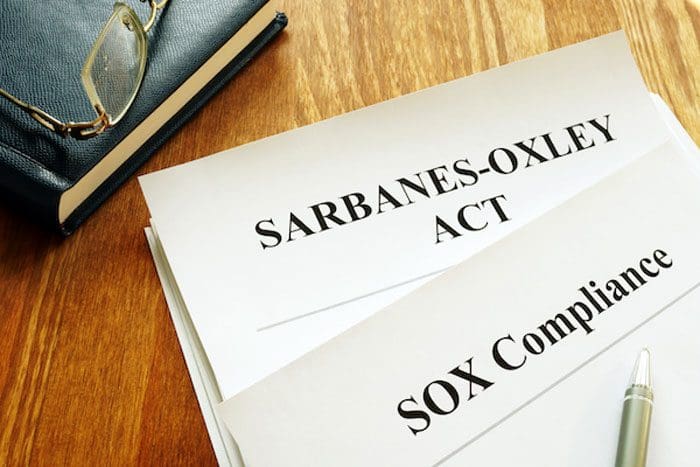
SOX Risk Assessment: How to Prepare, Steps & Challenges
Ready for a solution.

- Who We Serve
- Next Offering > --> -->

Technical Accounting Matters
Whether preparing for an IPO, acquiring a business or adopting a new standard, Riveron solves your most complex technical accounting challenges.
Riveron’s extensive technical accounting consulting expertise allows us to identify the issue, understand and research the guidance, analyze various accounting alternatives and help our clients arrive at a sound position. Partnering with your team, our technical financial accountants document each position to ensure it satisfies audit requirements and sustains scrutiny.
Our professionals help to solve a broad range of complex technical accounting issues, including:
- Business combinations
- Lease accounting
- Revenue recognition
- Current expected credit losses
- Accounting for income taxes
- Goodwill impairment
- Complex debt and equity instruments
- Stock-based compensation
- Derivatives and hedging
- Consolidation
- Variable interest entities
Riveron is not a CPA firm.
Accounting Consulting Group
Riveron’s Accounting Consulting Group (ACG) is a national team of US GAAP and IFRS subject matter experts dedicated to supporting clients and Riveron’s technical accounting advisory teams in highly complex accounting, financial reporting, and related regulatory matters. From transactions to implementing new standards, audit prep to a second set of eyes, ACG is here to assist you with technical accounting services, on-demand.
No Executive Leaders or Managing Directors matched your search.

Scott Gorrell

Joseph St. Denis
Related offerings, related insights, navigating gray areas in accounting: applying your best judgment to impairment, cecl, and more.
Accounting often requires a high degree of judgment, and companies rely heavily on the Office of the CFO to get it right. Here’s how accounting professionals can rethink initial approaches and learn from hindsight to ensure accuracy, audit readiness, and stronger path forward.
Rachel Baesler,
Audit Readiness: Top Focal Points for a Smooth Audit Cycle
Ready for the audit? PBC list prioritization is critical for accounting teams to be able to meet financial reporting deadlines and address the items most important to auditors, including five topics likely to face heightened scrutiny.
Patrick Garrett
Accounting for Segment Reporting: How to Report with Clarity and Respond to FASB Updates
To aid decision-making and audit readiness, reporting professionals should examine the latest principles of segment reporting.
Corporate Tax Pros: Get Ready for Income Tax Disclosure Changes
Proposed income tax disclosure accounting standards changes will impact corporate accounting and tax teams, and stakeholders can provide feedback to the FASB by May 30, 2023.
Anne Heffington, Nakia Cox
View All Insights
High Contrast
- Asia Pacific
- Latin America
- North America
- Afghanistan
- Bosnia and Herzegovina
- Cayman Islands
- Channel Islands
- Czech Republic
- Dominican Republic
- El Salvador
- Equatorial Guinea
- Hong Kong SAR, China
- Ireland (Republic of)
- Ivory Coast
- Macedonia (Republic of North)
- Netherlands
- New Zealand
- Philippines
- Puerto Rico
- Sao Tome & Principe
- Saudi Arabia
- South Africa
- Switzerland
- United Kingdom
- News releases
- RSM in the news

- AI, analytics and cloud services
- Audit and assurance
- Business operations and strategy
- Business tax
- Consulting services
- Family office services
- Financial management
- Global business services
- Managed services
- Mergers and acquisitions
- Private client
- Risk, fraud and cybersecurity
- See all services and capabilities
Strategic technology alliances
- Sage Intacct
- CorporateSight
- FamilySight
- PartnerSight
Featured topics
- 2024 economy and business opportunity
- Generative AI
- Middle market economics
- Environmental, social and governance
- Supply chain
Real Economy publications
- The Real Economy
- The Real Economy Industry Outlooks
- RSM US Middle Market Business Index
- The Real Economy Blog
- Construction
- Consumer goods
- Financial services
- Food and beverage
- Health care
- Life sciences
- Manufacturing
- Nonprofit and education
- Private equity
- Professional services
- Real estate
- Technology companies
- See all industry insights
- Business strategy and operations
- Family office
- Private client services
- Financial reporting resources
- Tax regulatory resources
Platform user insights and resources
- RSM Technology Blog
- Diversity and inclusion
- Middle market focus
- Our global approach
- Our strategy
- RSM alumni connection
- RSM Impact report
- RSM Classic experience
- RSM US Alliance
Experience RSM
- Your career at RSM
- Student opportunities
- Experienced professionals
- Executive careers
- Life at RSM
- Rewards and benefits
Spotlight on culture
Work with us.
- Careers in assurance
- Careers in consulting
- Careers in operations
- Careers in tax
- Our team in India
- Our team in El Salvador
- Apply for open roles
Popular Searches
Asset Management
Health Care
Partnersite
Your Recently Viewed Pages
Lorem ipsum
Dolor sit amet
Consectetur adipising
Technical accounting guides
Complex. voluminous. intricate. challenging..
These are all words used to describe U.S. generally accepted accounting principles (GAAP).
Add to that their ever-changing nature and it is easy to understand the difficulties financial reporting professionals face when applying them. To help alleviate those difficulties, we have prepared in-depth guides on several particularly complex and challenging accounting topics. Each of these guides provides comprehensive discussion of the applicable U.S. GAAP and many examples.
This page serves as your access point to all of our guides, as well as our Financial Reporting Resource Center , which provides access to many more articles, white papers and webcasts on the latest financial reporting developments.

A Guide to Accounting for Derivatives
Derivative instruments and the related accounting guidance and their financial reporting considerations are complex. We have developed this guide to provide a high-level overview of the accounting for, financial statement presentation and disclosure of derivative instruments. Accounting Standards Codification (ASC) 815, Derivatives and Hedging , provides the authoritative guidance for the areas covered by this guide.

A guide to accounting for investments, loans and other receivables
This publication provides an overview of the accounting for investments in debt and equity securities, loans (from a creditor’s perspective) and other receivables.

A guide for accounting for stock compensation
This guide assists companies in understanding and analyzing the accounting for share-based payments with employees and nonemployees under FASB Accounting Standards Codification (ASC) 718, “Compensation—Stock Compensation.” ASC 718 addresses the accounting for various types of equity-based awards issued as compensation for goods or services, and includes stock options, restricted stock, restricted stock units, stock appreciation rights, phantom stock and profits interests, as well as any other awards based at least in part on the value of an entity’s equity.

A guide to revenue recognition
Our comprehensive guide includes in-depth discussion and many examples to assist middle-market companies in applying the new revenue recognition model in Topic 606, “Revenue from Contracts with Customers,” of the Financial Accounting Standards Board’s (FASB) Accounting Standards Codification (ASC). ASC 606 provides a robust framework for recognizing revenue, and upon its effective date, replaced almost all pre-existing revenue recognition guidance, including industry-specific guidance, in U.S. generally accepted accounting principles (legacy GAAP).

A guide to lease accounting
Comprehensive discussion and examples to assist middle-market lessees in applying the leases guidance in Topic 842, Leases , of the Financial Accounting Standards Board’s Accounting Standards Codification (ASC). The most significant change for lessees under ASC 842 is the recognition of ROU assets and lease liabilities by lessees for most leases, which we discuss and illustrate in detail in our guide.

Accounting for debt and equity instruments in financing transactions
Our publication is intended to be a resource in understanding and analyzing some of the accounting guidance that may be relevant when accounting for debt and equity instruments issued in financing transactions. While often the accounting for these instruments is not considered until after the transactions are finalized, the appropriate upfront consideration of the accounting ramifications can help to minimize the risk of unanticipated and undesirable accounting consequences.

A guide to accounting for business combinations
We developed and designed our guide to help assist middle market companies in accounting for business combinations under Topic 805, Business Combinations, of the Financial Accounting Standards Board’s (FASB) Accounting Standards Codification. Applying the accounting model in Topic 805 is no small undertaking given some of the complexities embedded in that model (e.g., the accounting for contingent consideration requires initially measuring it at fair value, appropriately classifying it as either an asset, liability or equity and subsequently adjusting it to fair value if it is classified as an asset or liability). To help alleviate this complexity, our guide explains the accounting for a business combination in plain English and illustrates many aspects of this accounting with detailed examples and illustrations.

A guide to accounting for debt modifications and restructurings
For a variety of reasons, borrowers and lenders may renegotiate the terms of existing loans or exchange an existing loan for a new loan with the same lender. Naturally, there are accounting implications when the borrower and lender agree to modify or restructure an existing loan or exchange one loan for another. The accounting implications differ depending on whether the borrower’s or lender’s accounting is being considered. Our publication addresses the borrower’s accounting for the modification, restructuring or exchange of a loan.

A guide to hedge accounting upon the adoption of ASU 2017-12
Our publication is intended to provide a high-level overview of hedge accounting based on the hedging subtopics within the Financial Accounting Standards Board’s Accounting Standards Codification, as amended by Accounting Standards Update (ASU) 2017-12, Derivatives and Hedging (Topic 815): Targeted Improvements to Accounting for Hedging Activities .
Financial Reporting Resource Center
Stay on top of changes and updates to financial reporting with help from rsm. the subject matter is extensive. so are our insights and resources., subscribe to financial reporting insights, stay informed with our biweekly resource for recent financial reporting developments, including aicpa, sec, pcaob matters and other finance and accounting compliance considerations. .

THE POWER OF BEING UNDERSTOOD
ASSURANCE | TAX | CONSULTING
- Technologies
- RSM US client portals
- Cybersecurity
RSM US LLP is a limited liability partnership and the U.S. member firm of RSM International, a global network of independent assurance, tax and consulting firms. The member firms of RSM International collaborate to provide services to global clients, but are separate and distinct legal entities that cannot obligate each other. Each member firm is responsible only for its own acts and omissions, and not those of any other party. Visit rsmus.com/about for more information regarding RSM US LLP and RSM International.
©2024 RSM US LLP. All rights reserved.
- Terms of Use
- Do Not Sell or Share My Personal Information (California)

What is Technical Accounting?
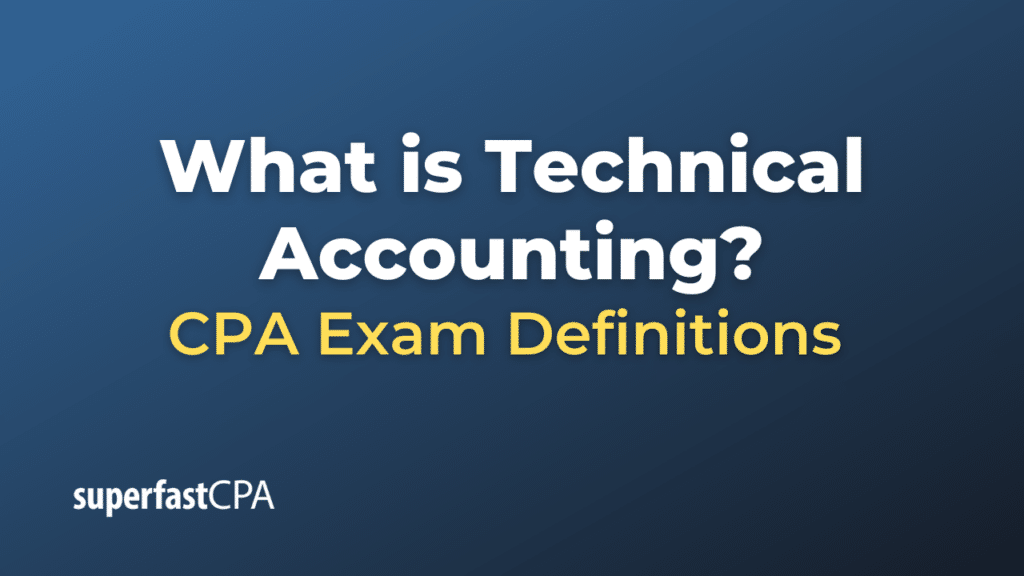

Share This...
Technical accounting.
Technical accounting refers to the deep understanding and application of accounting standards, principles, and rules. It encompasses the thorough knowledge of accounting frameworks (like GAAP or IFRS), as well as the ability to apply this knowledge to complex business transactions and financial reporting scenarios.
Technical accountants often have expertise in:
- Interpreting Accounting Standards : Understanding the nuances and detailed guidance provided by accounting standards on specific transactions or financial statement presentations.
- Complex Transaction Analysis : Analyzing and determining the appropriate accounting treatment for complex business transactions. This could include mergers and acquisitions, financial instruments, revenue recognition for complicated contracts, etc.
- Financial Reporting : Preparing and reviewing financial statements to ensure compliance with applicable accounting standards.
- Research and Documentation : When faced with unique or complicated transactions, technical accountants often have to research the relevant accounting standards or seek guidance from professional bodies or advisory firms. They then document their findings and the rationale behind the accounting treatment chosen.
- Liaising with Auditors : Technical accountants interact with external auditors, explaining and justifying the company’s application of accounting standards.
- Staying Updated : Accounting standards can evolve, and new ones can be issued. Technical accountants must stay updated on these changes and understand their implications.
Companies, especially those in industries with complex transactions or those that operate in multiple countries (with different accounting standards), often have technical accounting teams or experts on staff. These specialists ensure the company’s financial reporting is accurate, consistent, and in compliance with all relevant regulations.
Example of Technical Accounting
Let’s dive into a scenario that highlights the role of technical accounting:
Scenario: DigitalWave Corporation’s Revenue Recognition
DigitalWave Corporation is a tech company that sells both hardware products (smart devices) and software services (cloud storage and software-as-a-service applications). They often bundle these together in contracts with their customers. A customer might buy a smart device and get a one-year subscription to DigitalWave’s premium cloud storage service.
Given the complexity of these bundled contracts, there are numerous considerations under accounting standards, especially when it comes to revenue recognition.
The Technical Accounting Challenge :
Under certain accounting standards, such as the IFRS 15 or ASC 606 for GAAP, companies must recognize revenue from contracts with customers in a manner that depicts the transfer of promised goods or services. This involves allocating the transaction price to the separate performance obligations in the contract.
Steps Taken by DigitalWave’s Technical Accountant :
- Identify the Contract : The technical accountant verifies that they have a valid contract with the customer.
- Identify Performance Obligations : The contract is analyzed to determine its separate components. In this case, there’s the sale of the hardware (smart device) and the provision of a one-year cloud storage service.
- Determine the Transaction Price : The bundled price the customer pays for both the smart device and one-year service is determined.
- Allocate the Transaction Price : Here’s where it gets tricky. The technical accountant must allocate portions of the total price to the smart device and the cloud service based on their standalone selling prices. If a smart device typically sells for $500 and the annual cloud subscription for $100, then the allocation should reflect these standalone prices, even if the bundled price was a discounted $550.
- Recognize Revenue : As the performance obligations are met (i.e., the smart device is delivered and the cloud service is provided over the year), DigitalWave recognizes the revenue. The revenue for the device is recognized immediately upon delivery, while the revenue for the cloud service is recognized ratably over the year.
During this process, the technical accountant would need to:
- Research the specific requirements of the relevant accounting standard (like ASC 606) to ensure appropriate revenue recognition.
- Document their rationale and calculations, ensuring there’s a clear audit trail.
- Stay Updated on any changes or clarifications to the revenue recognition standard that might impact future contracts.
- Liaise with Auditors to explain DigitalWave’s approach and address any queries.
This example highlights just one area (revenue recognition) where technical accounting expertise is vital. Given the intricate nature of modern business transactions, the role of technical accountants in ensuring accurate and compliant financial reporting cannot be overstated.
Other Posts You'll Like...
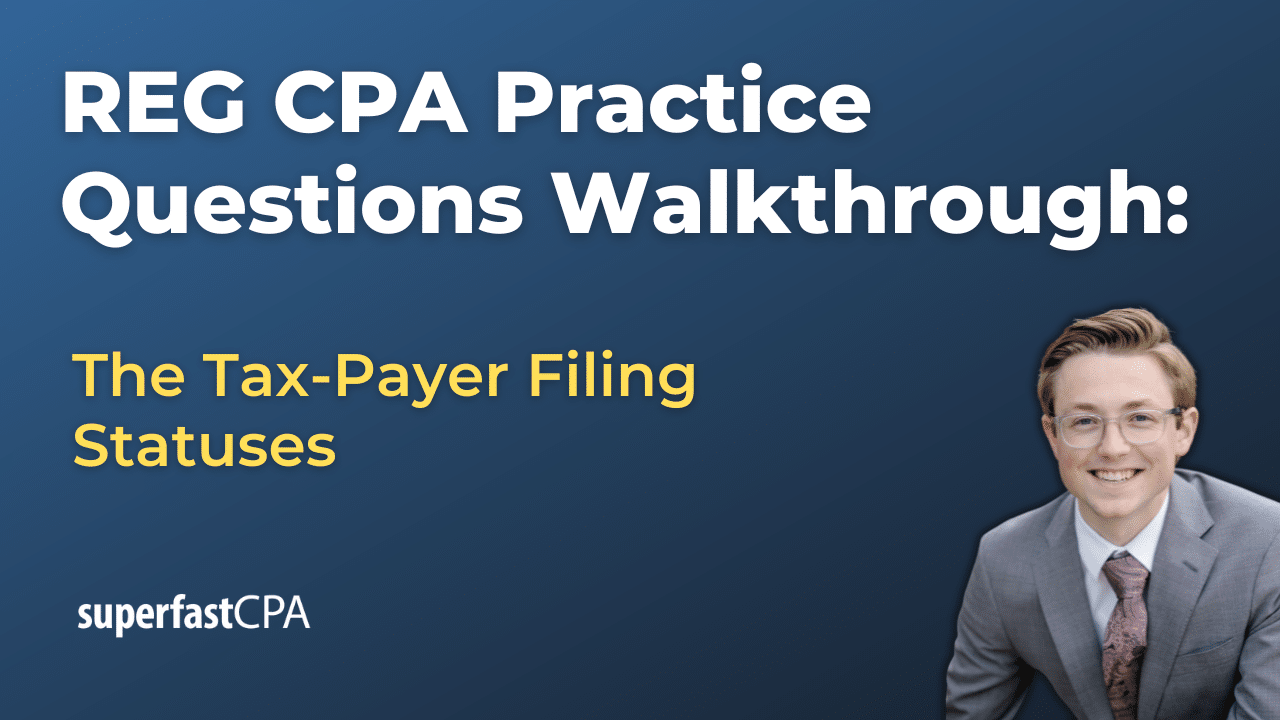
REG CPA Practice Questions Explained: The Tax-Payer Filing Statuses

REG CPA Practice Questions Explained: Understanding Losses from Hobbies and the Sale of Personal-Use Assets

REG CPA Practice Questions Explained: How to Calculate the QBI Deduction
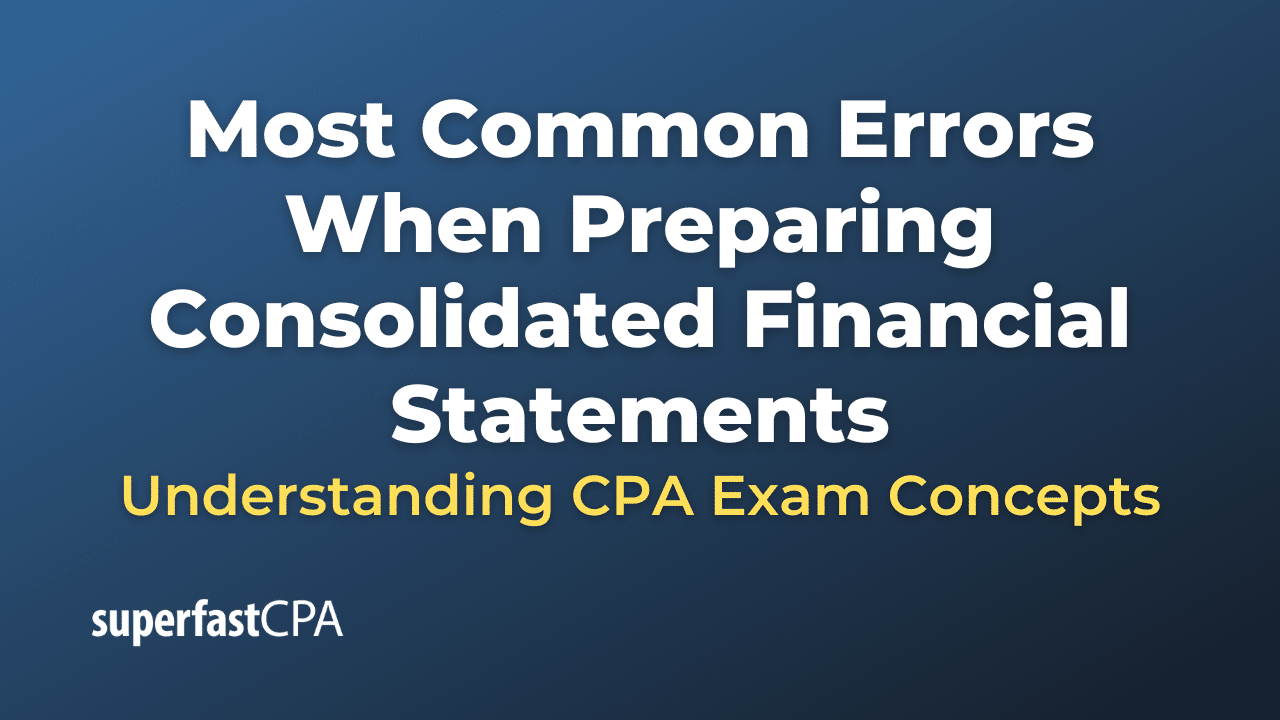
Most Common Errors When Preparing Consolidated Financial Statements

How are Joint Ventures Treated in Consolidated Financial Statements?

How to Treat Foreign Subsidiaries in Consolidated Financial Statements?
Helpful links.
- Learn to Study "Strategically"
- How to Pass a Failed CPA Exam
- Samples of SFCPA Study Tools
- SuperfastCPA Podcast
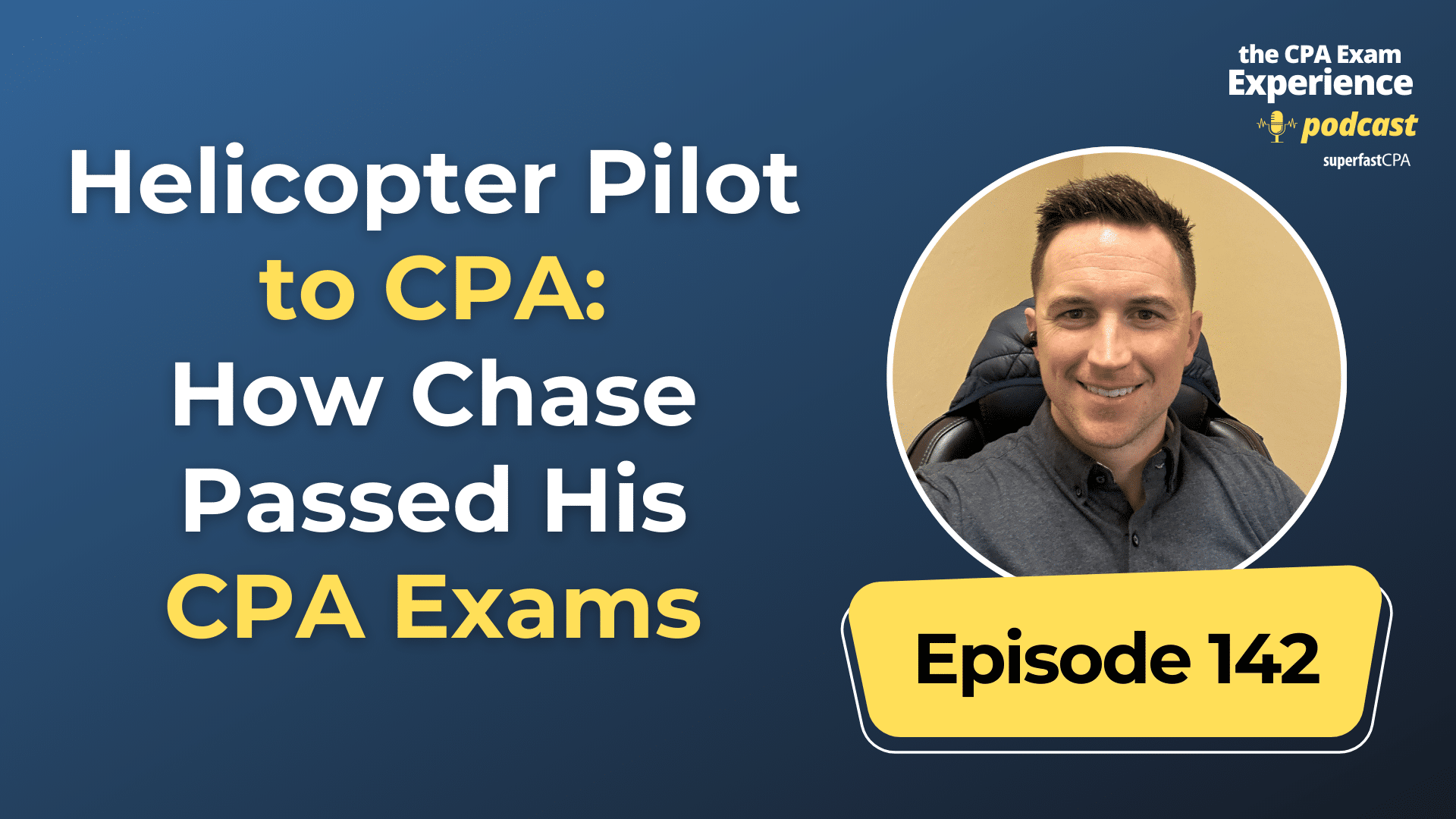
Helicopter Pilot to CPA: How Chase Passed His CPA Exams
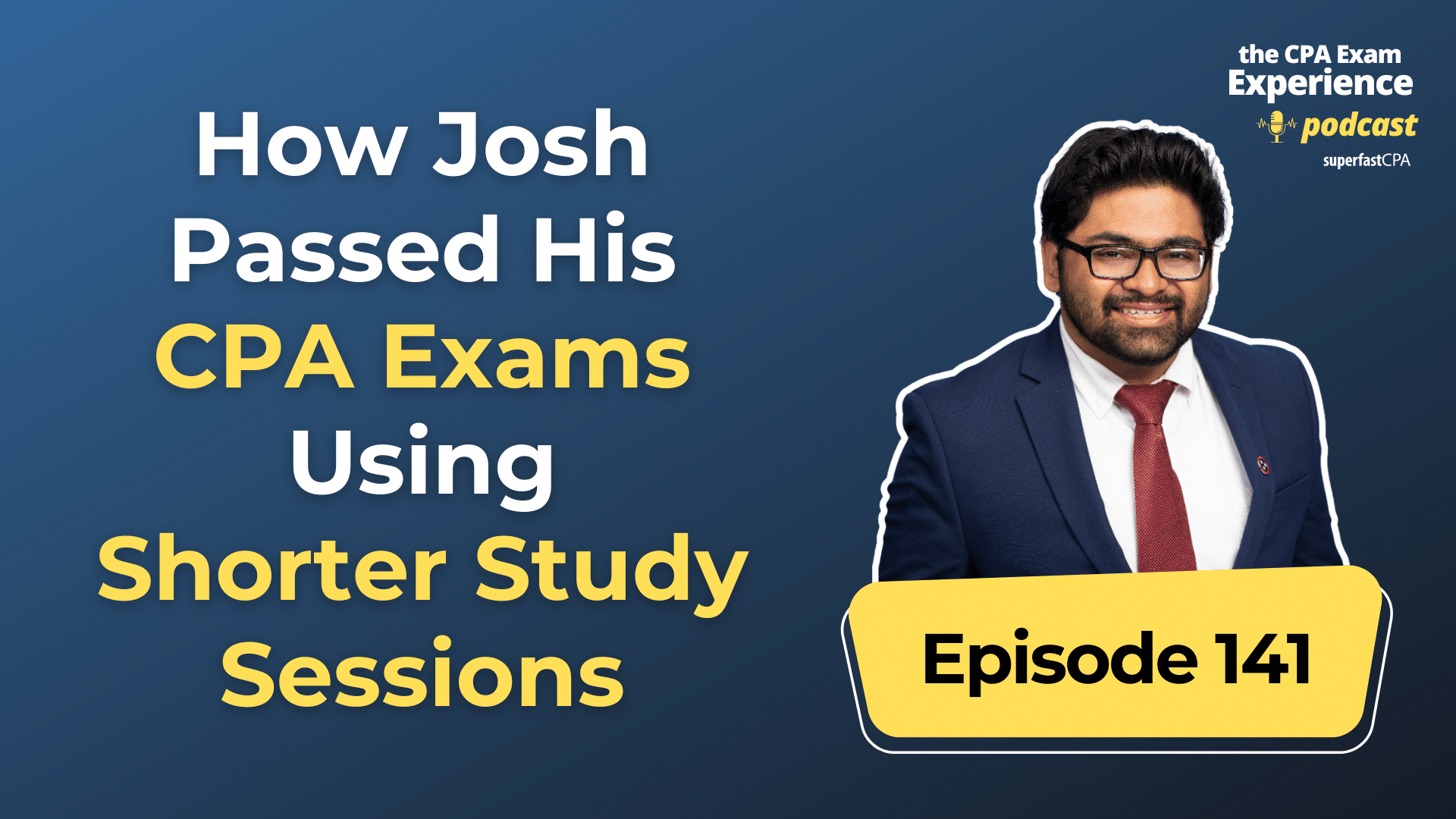
How Josh Passed His CPA Exams Using Shorter Study Sessions
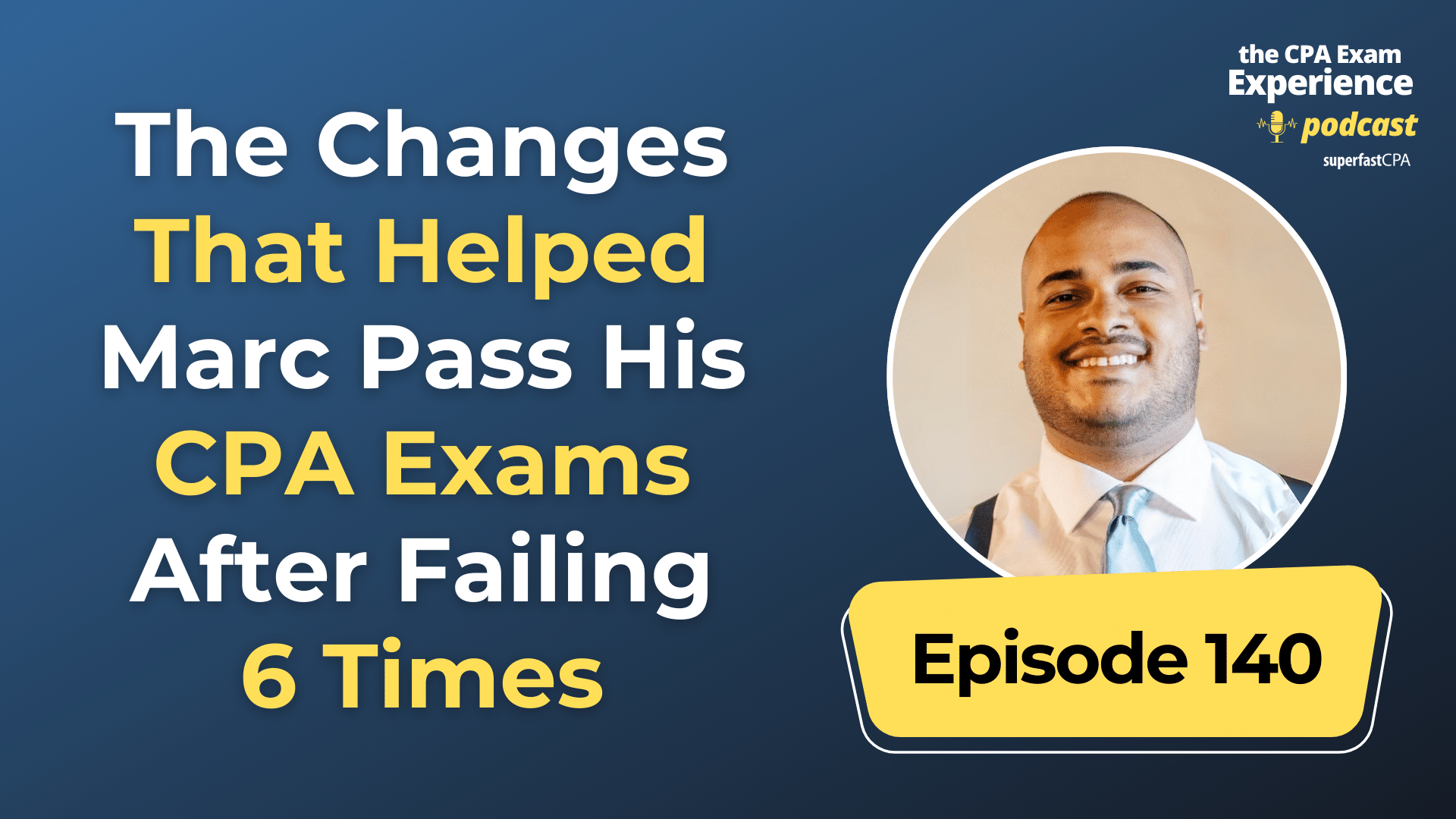
The Changes That Helped Marc Pass His CPA Exams After Failing 6 Times

The CPA Study Tweaks Gabi Used to Pass Her CPA Exams

How Skylar Went From a Psychology Major to Becoming a CPA

How Dalton Is Passing Exams by Making His CPA Study a Lifestyle
Want to pass as fast as possible, ( and avoid failing sections ), watch one of our free "study hacks" trainings for a free walkthrough of the superfastcpa study methods that have helped so many candidates pass their sections faster and avoid failing scores....

Make Your Study Process Easier and more effective with SuperfastCPA
Take Your CPA Exams with Confidence
- Free "Study Hacks" Training
- SuperfastCPA PRO Course
- SuperfastCPA Review Notes
- SuperfastCPA Audio Notes
- SuperfastCPA Quizzes
Get Started
- Free "Study Hacks Training"
- Read Reviews of SuperfastCPA
- Busy Candidate's Guide to Passing
- Subscribe to the Podcast
- Purchase Now
- Nate's Story
- Interviews with SFCPA Customers
- Our Study Methods
- SuperfastCPA Reviews
- CPA Score Release Dates
- The "Best" CPA Review Course
- Do You Really Need the CPA License?
- 7 Habits of Successful Candidates
- "Deep Work" & CPA Study
An official website of the United States government
The .gov means it’s official. Federal government websites often end in .gov or .mil. Before sharing sensitive information, make sure you’re on a federal government site.
The site is secure. The https:// ensures that you are connecting to the official website and that any information you provide is encrypted and transmitted securely.
- Publications
- Account settings
Preview improvements coming to the PMC website in October 2024. Learn More or Try it out now .
- Advanced Search
- Journal List
- v.6(1); Spring 2006
Current Challenges and Opportunities in Clinical Research Compliance
Wendy portier.
Compliance Officer - Director of Compliance & Audit
Claire Dunne
Managing Auditor
Compliance with the rules and regulations related to clinical research is like working your way through a maze, and the federal agencies tasked with clinical research oversight can sound like alphabet soup to the uninitiated (e.g., FDA, OHRP, DHHS, JCAHO). Clinical research regulatory oversight is the responsibility of two main governmental agencies: the Food and Drug Administration (FDA) and the Office for Human Research Protections (OHRP). Both FDA and OHRP are agencies under the Department of Health and Human Services (HHS). The FDA enforces the Food Drug and Cosmetic Act, which regulates foods, drugs, devices, and cosmetics, and OHRP regulates any research that is federally funded. The Joint Commission on the Accreditation of Healthcare Organizations (JCAHO) now also reviews aspects of clinical research activities during site assessment visits. Keeping abreast of all the rules, regulations and compliance issues related to clinical research can be a daunting task (see Figure 1 ).

Governmental Resources
Ochsner Clinic Foundation (OCF) has taken a unique approach to clinical research compliance by creating a Research Compliance Program (RCP). The RCP fits into a larger organizational Corporate Compliance Program, which includes the seven elements of a compliance program as outlined by the Office of the Inspector General (OIG). The RCP is also one component of OCF's overall Human Research Protection Program.
Human subject protection is the highest priority while conducting clinical research. In recent years, clinical research has come under increased public scrutiny due to media attention related to institutional research “shut downs” and subject deaths. Due to this level of heightened awareness, the compliance bar has risen for clinical research. The balance of this paper highlights challenges and opportunities related to clinical research compliance including areas possibly targeted by federal and state regulators.
For the past several years, the FDA has stepped up its enforcement efforts related to clinical research. Figure 2 reviews the five most common FDA compliance citations.

Five Most Common FDA Compliance Issues
Informed Consent
Obtaining informed consent is not merely the task of getting a subject to sign the Institutional Review Board (IRB) approved consent form. It is a process that involves a dialogue between the investigator and the subject where the subject is encouraged to discuss any concerns they may have about participating in the study. The investigator should address the risks and benefits of the study and answer any questions the subject may have. The subject must be given a copy of the consent form to take away with them.
This discussion must then be documented in the subject's chart as an accurate and complete record of the initial consenting process. The date and time consent was obtained should also be recorded. Each time the subject returns to see the investigator for a study visit they should be asked if they wish to continue to participate and if they have any questions or concerns regarding the study. This information should be documented in the subject's medical record to demonstrate the ongoing process of informed consent.
As the study progresses the consent form may go through some changes and updates so several versions exist. It is important that the most current version is used to consent the subject and a signed and dated copy is kept by the investigator. The FDA regulations at 21CFR50 detail the requirements for a consent form: 21CFR312.62(b) requires the maintenance of adequate and accurate case histories for drug studies.
Protocol Deviations and Violations
A protocol deviation or violation occurs when the established procedures and/or inclusion/exclusion criteria set out in the protocol have not been adhered to. Whenever it is under the control of the PI, all protocol deviations must obtain PRIOR approval from the IRB, if it affects subject safety or scientific validity, etc., and the sponsor. Any deviations from the protocol need to be documented. When a deviation occurs to eliminate an immediate hazard to subjects, prior approval may be waived.
Drug and Device Accountability
Drug and device accountability records are maintained to provide evidence that all investigational material is accounted for. At the conclusion of a study the Sponsor (and in some instances, federal regulators) may use these records to ensure the test article was distributed and disposed of correctly.
Inadequate Medical Records
It is the responsibility of the Principal Investigator to ensure that adequate and accurate records are maintained for each study subject. These records should include information on, but not limited to, the following: medical history, inclusion/exclusion criteria, physical and other relevant findings, informed consent process, subject education, each study visit, adverse events, exposure to test/control article, test reports, and procedures.
IRB Approval
The IRB is tasked with protecting the rights, safety and welfare of participants in research studies. The IRB is guided by the Belmont Report and is subject to regulation by federal oversight agencies, including FDA 21CFR50 and 56) and, in many cases, OHRP (45CFR46). The Principal Investigator must ensure the IRB is provided with all necessary and relevant information to allow an effective review of the research prior to study commencement. After the initial approval, the IRB must be kept informed of the progress of the study through the continuing review process and be informed of any changes to the research.
IND/IDE Applications
The FDA is focusing more attention on the need for Investigational New Drug (IND) / Investigational Device Exemption (IDE) applications prior to beginning certain clinical research studies, specifically studies that are sponsor-investigator initiated. IND and IDE applications allow the FDA to review studies for scientific validity and safety prior to study commencement thereby fulfilling their commitment to protect the public. The need for IND/IDE applications came to light out of a tragedy. Ellen Roche, a healthy 24-year old volunteer at Johns Hopkins, died after inhaling hexamethonium (a shelf chemical), which damaged her lungs. The FDA cited the researcher for failing to apply for an IND (1) , which may be needed even in clinical studies with approved drugs and devices. See “Frequently Asked Questions on Drug Development and Investigational New Drug Applications” at http://www.fda.gov/cder/about/smallbiz/faq.htm for further guidance .
Office of the Inspector General (OIG)
The OIG's mission is to improve HHS programs and operations and to protect them against fraud, waste, and abuse by conducting audits and investigations. Annually, the OIG issues a Work Plan that describes the various project areas perceived as mission critical to the OIG and HHS. In recent years, clinical research has received more and more attention by the OIG. The 2003 and 2004 Work Plan addressed the following areas related to clinical research: human subject protections for children, commitment of Principal Investigator's effort in grant applications, grantee administration of funds, clinical trial oversight, and adverse event monitoring and reporting (2) . At OCF, we use the OIG Work Plan to assist in planning our corporate and research compliance program initiatives.
Compliance Program Guidance
In August 2003, the OIG began soliciting public comment related to developing and implementing effective “Compliance Program Guidance (CPG) for Recipients of NIH Research Grants.” The OIG's request has highlighted the need for research compliance programs that must include an audit function in order to adequately assess the internal control structure of an organization. Risk areas tentatively identified include: the proper allocation of charges to grant projects, “time and effort” reporting, including an accurate reporting of the commitment of effort by researchers, and use of program income (3) .
Segregation of Sales & Marketing from Research
In April 2003, the OIG published a compliance guidance aimed at assisting pharmaceutical manufacturers in developing and implementing internal controls and procedures that promote adherence to applicable regulations and requirements of the federal health care programs. One area of interest to clinical research sites is the need for sponsor companies to separate sales from research activities, which is especially applicable to Phase 4 post-marketing studies. The OIG's Guidance states, “Post-marketing research activities should be especially scrutinized to ensure that they are legitimate and not simply a pretext to generate prescriptions of a drug. Prudent manufacturers will develop contracting procedures that clearly separate the awarding of research contracts from marketing. Research contracts that originate through the sales or marketing functions – or that are offered to purchasers in connection with sales contacts – are particularly suspect” (4) . The concepts outlined in this CPG can also be applied to the device industry.
Clinical Trial Billing & Residual Funds
A solid billing program is necessary in order to ensure proper billing to third party payors and study sponsors. Billing errors in clinical trials can lead to issues such as “double-dipping” and/or Medicare billing fraud, e.g., billing a third party payor for procedures paid for by the sponsor. Substantial penalties are associated with violations of federal and state billing requirements (5) .
In 1995 and 2000, the Centers for Medicare and Medicaid Services (formerly known as Health Care Financing Administration - HCFA) issued National Coverage Decisions (NCD) related to clinical trials. In certain instances, Medicare may be billed for “routine costs” associated with a “qualifying” clinical trial. Implicit in these NCD's is the requirement to clearly document the segregation of individual procedures between those that are considered “standard therapy” and/or “medically necessary” and those that are trial induced. See Figure 1 – CMS for further guidance.
Another risk area is associated with residual funds. According to Clinical Trials Compliance September, 2003 issue, “a lack of policies and procedures regarding leftover money at the end of a trial can also raise issues” (5) .
HIPAA is the acronym for the Health Insurance Portability and Accountability Act, which became law in August 1996. The Secretary of HHS was mandated to produce a regulation to protect the privacy of certain health information. This mandate resulted in the publication of the regulation (45CFR160 and 164) “Standards for Privacy of Individually Identifiable Health Information”, more commonly referred to as the “Privacy Rule.” By the compliance date of April 14 th , 2003 (April 14 th , 2004 for small health plans) covered entities were required to have standards implemented to protect individually identifiable health information (usually referred to as “protected health information” or “PHI”) from misuse.
The Privacy Rule defines research as a “systematic investigation, including research development, testing, and evaluation, designed to develop or contribute to generalizable knowledge”. While this definition is similar to the definition of research under the federal Common Rule, the Privacy Rule is broader in its coverage. For example, the Common Rule exempts research where information cannot be readily identifiable but under the Privacy Rule this information may still qualify as PHI and require an authorization or waiver of authorization.
The implementation of HIPAA has had a significant impact on clinical research because of these new requirements for authorization and protection of health information.
Conflict of Interest
The Enron and WorldCom scandals shook the accounting world. Both of these financial debacles were fraught with conflicts of interest from the Chief Executive Officer to the Board of Directors to the External Auditors. These accounting scandals have resulted in new laws, e.g., Sarbanes Oxley Act, which specifically addresses conflicts of interest.
Conflict of Interest is also a hot topic in clinical research encompassing institutional officials, members of the Board, investigators, and IRB members. Currently, the FDA requires financial disclosure from every investigator involved in a FDA clinical study. If an investigator has a financial conflict of interest, as defined by institutional policies, in a clinical study, the conflict can represent risk to the subject, the organization, and the sponsor. Therefore, disclosing and managing conflicts of interest upfront is of utmost importance. The Code of Federal Regulations currently forbids IRB members to participate in the review of a project in which they have a conflict of interest (45CFR46.107e).
One example of a possible institutional conflict of interest occurred at one of the nation's largest cancer centers when 195 people were enrolled in a study without being informed that the institution's president held a financial interest in the product that could potentially earn him millions (6) .
Conflict of interest is an important issue for institutions, IRBs, and single investigators to address. Guidance regarding conflict of interest can be obtained from the following governmental agencies and professional organizations: FDA, OHRP, NIH, Association of American Medical Colleges (AAMC), and the Association of American Universities (AAU) to name a few.
Complying with all of the rules and regulations related to clinical research can be overwhelming. The root causes of non-compliance can be found in poor record keeping and lack of training (5) . To address these causes, several clinical research professional organizations offer educational opportunities including certification for clinical research coordinators, investigators, and IRB professionals (see Figure 3 ).

Professional Organizations
According to the American Academy of Pharmaceutical Physicians (AAPP), 2003, certification signifies the presence of a basic knowledge sufficient for the safe and ethical conduct of a clinical trial in accordance with the appropriate ethical, scientific, legal, and regulatory standards. Recently, the AAPP President, Dr. Hans de Haan, specifically discussed investigator certification at the Mayo Clinic conference, and the title of his talk sums up one approach to address the current challenges and opportunities in clinical research compliance: “Current Issues in Clinical Research: How Education, Certification, and Validation Will Improve the Quality of Research” (7) .

Wendy Portier, RN, MSN, CCRC, CCRP, Compliance Officer - Director of Compliance & Audit

Claire Dunne, PhD, Managing Auditor
- Clinical Trials Compliance. FDA warning letter signals move to tighten oversight. June 2003 Strategies for Medicare Billing, FDA, and Research Compliance, 2, 1–12. [ Google Scholar ]
- Office of the Inspector General. Work Plan. 2003 Retrieved October 14, 2003 from the World Wide Web: http://oig.hhs.gov/publications/workplan.html . [ Google Scholar ]
- Federal Register. Solicitation of Information and Recommendations for Developing Compliance Program Guidance for Recipients of NIH Research Grants. September 2003 Retrieved October 14, 2003 from the World Wide Web: http://oig.hhs.gov/authorities/docs/FRcpgNIHsolicitation.pdf . [ Google Scholar ]
- Office of the Inspector General. Compliance Program Guidance for Pharmaceutical Manufacturers. CPG (2003) Retrieved October 14, 2003 from the World Wide Web: http://oig.hhs.gov/fraud/docs/complianceguidance/042803pharmacymfgnonfr.pdf . [ Google Scholar ]
- Clinical Trials Compliance. Sidestepping the five most common FDA compliance pitfalls. September 2003; 2 (9):1–3. Strategies for Medicare Billing, FDA, and Research Compliance. [ Google Scholar ]
- Gillis J. A hospital's conflict of interest - Patients weren't told of stake in cancer drug. June, 2002 Retrieved October 14, 2003 from the World Wide Web: http://www.commondreams.org/headlines02/0630-03.htm . [ PubMed ] [ Google Scholar ]
- Haan H. American Academy of Pharmaceutical Physicians. September, 2003 Retrieved October 14, 2003 from the World Wide Web: http://aapp.org/pdf/HansMayoPresentation.pdf . [ Google Scholar ]

Accounting Research for Shaping a Better World
In previous contributions to the Knowledge Gateway, we proposed a long overdue redefinition of accounting as “a technical, social and moral practice concerned with the sustainable utilisation of resources and proper accountability to stakeholders to enable the flourishing of organisations, people and nature”. [1] This proposal unmistakably presents accounting in substance as a multidimensional technical, social and moral practice rather than a mere neutral, benign, technical practice.
In the first of these Knowledge Gateway contributions, entitled “ Redefining Accounting for Tomorrow ”, we argued “how we define accounting today and what defines accounting tomorrow are fundamental to the purpose, value and identity of the accountancy profession”. The proposed definition “engages with the full dimensions of accounting as an enabling, disenabling and pervasive practice as has emerged in recent decades and reflects the discipline’s growing interdisciplinary orientation”.
Subsequently, an SOS was issued for accounting educators, to contribute to developing accounting and accountants for shaping a better world in the second contribution, entitled “ SOS Accounting Educators: Developing Accounting and Accountants for a Better World ”. Herein, we argued “professional accountants and non-accountants alike need to appreciate and understand the effects of accounting upon organizations, people and nature to help shape a better world”. Having received overwhelming acceptance and support for our definition from academics, we turn to its implications for accounting research.
Accounting research helps in understanding our past and present, in terms of historical and contemporary studies respectively, so that we apply accounting knowledge and practice in creating a sustainable future. It informs teaching and learning and contributes to understanding the nature, roles, uses and impacts of accounting in the world. This understanding contributes to the capacity of the profession, through cross-disciplinary interaction and engagement combined with an enhanced appreciation of non-financial schemas of value and their potential use in shaping a better world. Accounting education and accounting research are inseparable. One should not be undertaken in any formal, higher education context without the other. This is not negotiable in our view.
As in the second contribution, we urge the international accountancy profession to make accounting research more central to accounting development, particularly to its redevelopment and proposed intention or aspiration “to enable the flourishing of organisations, people and nature.” In addition, accounting educators can be more impactful and enhance their value by teaching students to understand, portray and practice accounting as a multidimensional technical, social and moral practice for shaping a better world.
Accounting researchers are encouraged to become more interdisciplinary in their research to leverage off other disciplines playing paramount roles in dealing with big challenges and perplexing issues in local, national, regional and international contexts. Urgent among them are climate crisis, pandemics, sustainability, human rights, poverty and inequality, oppression and warfare, hunger and food insecurity, water provision and management, global refugee movements, health care provision, habitat and biodiversity, government corruption and accountability, education availability and accessibility.
Building on accounting research undertaken in the sociological, interpretive, and critical tradition from the early-to-mid 1980s, accounting education will benefit from being strategically oriented towards our proposed new definition of accounting. Such researchers focus attention on exploring and better understanding the enabling, disenabling and pervasive characteristics of accounting. Particularly, they reveal how it impacts human behaviour, shapes organisational and social culture, and address the implications for organisational and social functioning and development.
Paradoxically while the volume and diversity of accounting research conducted and published internationally has strongly grown across the past four decades, the accountancy profession appears to be overlooking accounting research findings and related opportunities for advancement of the public interest and the betterment of society and nature. Accounting educators and researchers, as well as professional accountants and professional accountancy organizations, can further apply themselves to do more to optimize their full potential and grow more connected to each other. Greater cohesive action and connectivity is desirable, for the best interests of accountancy and its stakeholders, including society and the natural environment.
Bridging this unhelpful, extending divide is crucial for the collective accountancy profession to make an optimal and impactful contribution to shaping a better future. In explicit terms, the accountancy profession, including professional accountants and professional accountancy organizations, as well as accounting educators and researchers, all need to be more closely engaged and strategically connected.
Learning from our past, we can shape our future from tomorrow for the greater good of people, nature, and the planet. For instance, a major international evaluation of the impacts of New Public Management (NPM), enabled in action by means of techniques and processes of accounting, is both overdue and necessary. Under NPM, there is growing and concerning evidence of the goal displacement effect towards business profit/commercial returns and a divergence away from community and society service.
Around the world, today’s accountancy students, as well as tomorrow’s, are the next generation of accountants. These students require an appreciation of the big issues society and nature face. They will, with appropriate, stimulating leadership and guidance, react positively and co-operatively to a future integration of accounting educators and researchers and the professional accountancy associations and practicing professional accountants.
A precedent for collaboration exists. During the early-to-late 1970s and the 1980s, academic accountants regularly published articles in professional accounting journals. This and other forms of connection and engagement offer the prospect of a future profession that engages far more proactively with the human issues and their moral, social, institutional, economic and environmental aspects. Addressing this broad landscape requires the mutual respect and collaboration of all the key players in the accounting discipline if accountancy is to realise its full potential for shaping a better world.
This multifaceted technical, social and moral agenda can be effectively and innovatively deployed in helping to adequately deal with big challenges and perplexing issues confronting society. The notion of “governance by numbers” has gained almost unquestioned currency today. According to Supiot, “governance by numbers gives immense power to those who construct the figures, because this is conceived as a technical exercise which needs not be exposed to open debate” (2017, p. 163). However, as a multifaceted technical, social and moral practice, accounting becomes misunderstood when engaged as merely technical, in operation.
Of importance to a future holistic accounting research strategy, our proposed new definition of accounting offers a framework of key conceptual questions:
- Technical practice: "How do we do accounting?"
- Social practice: "What does accounting do?"
- Moral practice: "What should accounting do" or "What should accounting not do?"
Importantly, accounting is more influential in the world and in our lives than many people may think. A broader, clearer, more realistic and ‘game-changing’ definition of accounting, which portrays the discipline as “an instrumental social and moral practice” (Carnegie , et al., 2022, p. 9) is a critical step to take.
In a complex and complicated world, these questions are intended for accounting to be understood and appreciated as being well beyond some supposedly objective set of rules to be applied. Instead, accounting needs to be “fit-for-purpose”, undertaken with full regard for the diversity of organizational and social contexts in which it operates.
We encourage professional and academic accountants alike to view accounting more holistically if it is to meet its full potential and responsibility. This lack of connectedness is now seen to be an inherent weakness of the profession. This can and indeed should be ameliorated by leaders on both sides of the international profession for the discipline to become more instrumental in shaping a better world from tomorrow.
[1] For in-depth coverage, see Carnegie, et al. (2021) and Carnegie, et al. (2022).
References
Carnegie, G., Parker, L. and Tsahuridu, E. (2020), It’s 2020: what is accounting today? Australian Accounting Review , Vol. 31 No. 1, pp. 65-73, available at: https://onlinelibrary.wiley.com/doi/epdf/10.1111/auar.12325
Carnegie, G.D., Ferri, P., Parker, L.D., Sidaway, S.I.L. and Tsahuridu, E. E. (2022), Accounting as technical, social and moral practice: the monetary valuation of public cultural, heritage and scientific collections in financial reports, Australian Accounting Review , 5 April, available at: https://onlinelibrary.wiley.com/doi/full/10.1111/auar.12371
Supiot, A. (2017), Governance by Numbers: The Making of a Legal Model of Allegiance , Oxford: Hart Publishing.
Garry Carnegie
Emeritus Professor, Department of Accounting, RMIT University
Garry Carnegie is an Emeritus Professor of RMIT University having served as Head, School of Accounting and Professor of Accounting at RMIT from 2010 to 2017. Prior to joining academe in 1985, Professor Carnegie gained experience in the IT industry, professional accounting services and in financial services. Prior to joining RMIT, he held full-time professorial posts at Deakin University, Melbourne University Private/The University of Melbourne, and at the University of Ballarat (now Federation University Australia). He was the Editor/Joint Editor of Accounting History for a continuous period of 25 years and is an Associate Editor of Accounting, Auditing & Accountability Journal. He is Joint Editor of the EE Handbook of Accounting, Accountability and Governance.
Lee Parker is Research Professor of Accounting, Glasgow University, Scotland . Globally published, Lee is joint founding editor of Accounting, Auditing & Accountability Journal and member of over 20 journal editorial boards. He has been President: Academy of Accounting Historians (USA), American Accounting Association Public Interest section, Vice-President (International) American Accounting Association, President CPA Australia (SA Division), Deputy Chair Australian Institute of Management (SA), member of the Australian Accounting Hall of Fame and the Australian Centre For Social and Environmental Accounting Research Hall of Fame.
Eva Tsahuridu, PhD
Business Ethicist, Board Director
Dr. Eva Tsahuridu is a business ethicist who has been researching, teaching and advising on business and professional ethics for over two decades. Eva is currently a board director and advisor. She is the section editor of Practice in Business Ethics of the Journal of Business Ethics, an executive editor of Philosophy of Management and the deputy chair of the Australasian Business Ethics Network. Eva writes for practitioner and academic publications and her research interests include personal and organisational ethical conduct, whistleblowing, ethical and professional standards and philosophy of management.
Join us at one of our events. Register Today
- Newsletters
- Client Portal
- Make Payment
- (855) Marcum1
Services Search
- Complex & Technical Accounting
Quickly resolve complex finance and accounting issues.
- Financial Accounting & Advisory Services
Complex and highly technical finance and accounting issues can bog you down, eat up valuable time and cause added stress.
Marcum Financial Accounting & Advisory Services professionals supply the skills you need—technical knowledge, experience, and problem-solving ability—to quickly resolve complex finance and accounting issues. At the same time, they assist you in strengthening your organization’s operational effectiveness and collaborative environment.
Adopting new accounting rules and standards like ASC 606 (Revenue) or 842 (Leasing) is easier with experienced professionals at your side to help guide you and lighten the work load. In addition, Marcum consultants can help you modify systems and processes, as necessary, and ensure your staff understands the full financial impact of any changes.
Complex accounting issues Marcum can help you address include:
- Debt and equity financing.
- Revenue recognition.
- Business combinations.
- Stock options and equity awards.
- Hedge fund accounting.
- Variable interest entity assessments.
- Tax reporting, and more.
With Marcum professionals on your team, there’s no need to struggle to allocate your in-house resources to manage the research, resolutions and documentation complex accounting matters require. Every day, we help organizations like yours deal with finance and technical accounting complexity.
So whether you’re short-handed, lacking the necessary skills in-house, or you can’t afford to pull staff from other high-value projects, ask Marcum .
Technical Consulting and Special Project Management Services
Complex accounting issues.
We can research, document conclusions, and implement related processes for complex accounting issues, examples include:
- Debt and equity financings.
- Revenue recognition matters.
- Hedge accounting.
- Accounting for stock compensation.
- Variable Interest Entity assessments.
- Equity method accounting.
External & Internal Reporting Processes
We can manage all aspects of internal and external financial reporting for private companies and SEC reporting, including the review of each business process, and recommendation and implementation of process improvements. The key to stress-free closing and reporting is implementing the appropriate processes, getting the right resources in place and energizing the organization to meet the required timelines. We can lead these efforts or provide any needed assistance while overseeing any required audits or reviews. Here are a sample of the reporting processes in which we have significant experience:
Preparing and submitting SEC filings (or other external requirements)
- All debt and equity filings.
- Offering memorandum.
- IPO related filings.
- Monthly reporting packages outlining key performance indicators.
- Board and Audit Committee presentations.
- Proposed budgets and financial modeling.
- Cash flow analysis and forecasting.
Transaction Services
We offer a full range of transactional services to assist in addressing all financial and non-financial matters that occur pre or post transaction. Our core transaction services for buyers and sellers includes:
- Due diligence and quality of earnings reports.
- Valuation services.
- Deal negotiation.
- Opening balance sheet audits.
- Financial models of acquired business, including budget and cash flow forecast.
- Purchase accounting, integration and subsequent accounting procedures.
Internal Control and SOX Compliance
Marcum’s Risk Advisory Services helps Audit Committees, CFOs, audit executives and management improve their business operations; mitigate risks; enhance control effectiveness; provide best practice solutions; perform risk assessments; and manage compliance with laws, regulations, policies and procedures:
- Internal audit outsourcing and co-sourcing.
- Internal audit department start-up.
- SOX compliance project planning and management.
- SOX documentation, evaluation, testing and remediation of risks and controls.
Other Services
We can lead or assist with virtually any finance or accounting related special project. Here is just a sample of the engagements in which we have experience:
- ERP system implementation (SAP, Oracle, Netsuite, QuickBooks, Great Plains).
- IPO services including readiness, process planning, and execution.
- Carve out financials.
- Corporate restructurings.
- Consolidation services.
- Assisting your team with any difficult accounting, reporting, or operational need.
Insights & News

Deciphering the Latest Financial Reporting Trends: Key Takeaways from the 2023 AICPA & CIMA SEC and PCAOB Conference

Year-end Reporting Reminders: Accounting Considerations During Periods with Volatile Economic Conditions

Navigating the CECL Standard: A Strategic Imperative for Financial Reporting

Crafting a Strategic Path for ESG Excellence: A Four-step Framework

Revamped Segment Reporting Standards: A Leap Towards Enhanced Financial Disclosures

Partnerships and S Corporations May Not Deduct Certain Charitable Contributions

Strategic Accounting Methods for Businesses: Identifying Opportunities to Defer Income and Save on Taxes

Profit from Losses? How IRS’s Section 382 Can Make or Break Your Business Strategy

The C-Corporation Advantage: Qualified Small Business Stock Exclusion

Accounting Methods
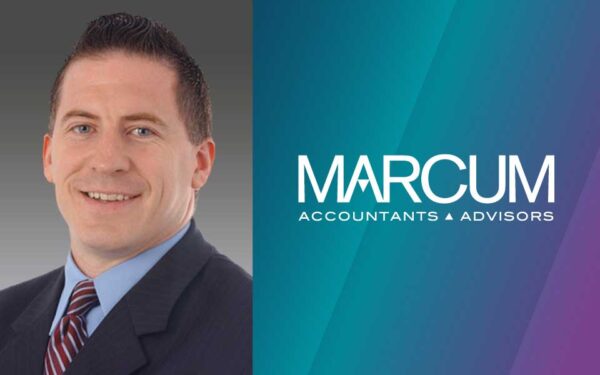
Financial Accounting & Advisory Services Leader Ethan Brysgel was quoted in NJBiz about the need for a more sophisticated and well-prepared controllership function to support the rapid pace of business growth.

National Financial Accounting and Advisory Services Leader Ethan Brysgel discussed best practices for financial controls with New Haven Biz, for an article about a $40 million embezzlement at Yale School of Medicine.
Select the region to view contacts.
- All Offices
- Connecticut
- Massachusetts
- Rhode Island

Ethan Brysgel
National financial accounting & advisory services leader.
- New Haven, CT

David Chapman

Michael Discepolo

Tod Edgecomb
- Portland, ME

Cassandra Kral-Dillon
Managing director, cfo consulting.

Dawn Meeker

Patrick O'Reilly

William Stetter

James D. Wilkinson
- Providence, RI
Have a Question? Ask Marcum

- Financial Controller "> Financial Controller
Financial Controller
Home » News, Events & Blogs » Financial Controller

Financial Controller -Job Opening
Upper Marlboro, MD, US
Today Requisition ID: 1143
Responsibilities
- Manage and assist on all accounting operations, including Billing, A/R, A/P, GL, Cost Accounting, Inventory Accounting, and Revenue Recognition
- Coordinate and direct the preparation of the budget and financial forecasts and report variances
- Prepare timely monthly financial statements
- Coordinate the preparation of regulatory reporting
- Research technical accounting issues for compliance
- Support month-end and year-end close process
- Ensure quality control over financial transactions and financial reporting
- Manage and comply with local, state, and federal government reporting requirements and tax filings
- Develop and document business processes and accounting policies to maintain and strengthen internal controls
- Additional controller duties as necessary
- Proven working experience as a Financial controller
- 5+ years of overall combined accounting and finance experience
- Degree in Accounting preferred
- Knowledge of accounting principles and procedures
- Experience with preparing financial statements
- Experience with general ledger functions and the month-end/year-end close process
- Excellent accounting software user and administration skills
Job details
- $60,000 – $90,000 per year
- Monday to Friday Day shift
- Health insurance, Paid time off, 401(k), Dental Insurance, Life Insurance, Disability Insurance, Flexible spending account
Physical Setting
Supplemental Pay
Work Location:
- One location
Remote work allowed:
Related Posts

Inspiring Holiday Print Marketing Ideas for 2023

The Power of Thanksgiving Direct Mail Postcards

How Much Does Poster Printing Cost?

Customer Retention in the Post-Pandemic Era: Strategies and Solutions
We appreciate your interest in our industry leading custom printing services, direct mail services, bindery options, and more. For more information about Linemark and our vast range of solutions for you and your business, fill out the form below or give us a call today.
(301) 925-8943
Mon-Fri, 8am - 5pm EST
501 Prince Georges Blvd Upper Marlboro, MD 20774
Discover the latest MyICAEW app for ACA students and members, available to download now. Find out more
- Benefits of membership
Gain access to world-leading information resources, guidance and local networks.
- Visit Benefits of membership
Becoming a member
98% of the best global brands rely on ICAEW Chartered Accountants.
- Visit Becoming a member
- Pay fees and subscriptions
Your membership subscription enables ICAEW to provide support to members.
Fees and subscriptions
Member rewards.
Take advantage of the range of value added or discounted member benefits.
- Member rewards – More from your membership
- Technical and ethics support
- Support throughout your career
Information and resources for every stage of your career.
Member Insights Survey
Let us know about the issues affecting you, your business and your clients.
- Complete the survey
From software start-ups to high-flying airlines and high street banks, 98% of the best global brands rely on ICAEW Chartered Accountants. A career as an ICAEW Chartered Accountant means the opportunity to work in any organisation, in any sector, whatever your ambitions.
Everything you need to know about ICAEW annual membership fees, community and faculty subscriptions, eligibility for reduced rates and details of how you can pay.
Membership administration
Welcome to the ICAEW members area: your portal to members'-only content, offers, discounts, regulations and membership information.
- Continuing Professional Development (CPD)
Continuing Professional Development (CPD) is an integral part of being a successful ICAEW Chartered Accountant.
The ICAEW Chartered Accountant qualification, the ACA, is one of the most advanced learning and professional development programmes available. It is valued around the world in business, practice and the public sector.

ACA for employers
Train the next generation of chartered accountants in your business or organisation. Discover how your organisation can attract, train and retain the best accountancy talent, how to become authorised to offer ACA training and the support and guidance on offer if you are already providing training.
Digital learning materials via BibliU
All ACA, ICAEW CFAB and Level 4 apprenticeship learning materials are now digital only. Read our guide on how to access your learning materials on the ICAEW Bookshelf using the BibliU app or through your browser.
- Find out more
Take a look at ICAEW training films
Focusing on professional scepticism, ethics and everyday business challenges, our training films are used by firms and companies around the world to support their in-house training and business development teams.
Attract and retain the next generation of accounting and finance professionals with our world-leading accountancy qualifications. Become authorised to offer ACA training and help your business stay ahead.
CPD guidance and help
Continuing Professional Development (CPD) is an integral part of being a successful ICAEW Chartered Accountant. Find support on ICAEW's CPD requirements and access resources to help your professional development.
Leadership Development Programmes
ICAEW Academy’s in-depth leadership development programmes take a holistic approach to combine insightful mentoring or coaching, to exclusive events, peer learning groups and workshops. Catering for those significant transitions in your career, these leadership development programmes are instrumental to achieving your ambitions or fulfilling your succession planning goals.
Specialist Finance Qualifications & Programmes
Whatever future path you choose, ICAEW will support the development and acceleration of your career at each stage to enhance your career.

Why a career in chartered accountancy?
If you think chartered accountants spend their lives confined to their desks, then think again. They are sitting on the boards of multinational companies, testifying in court and advising governments, as well as supporting charities and businesses from every industry all over the world.
- Why chartered accountancy?

Search for qualified ACA jobs
Matching highly skilled ICAEW members with attractive organisations seeking talented accountancy and finance professionals.
Volunteering roles
Helping skilled and in-demand chartered accountants give back and strengthen not-for-profit sector with currently over 2,300 organisations posting a variety of volunteering roles with ICAEW.
- Search for volunteer roles
- Get ahead by volunteering
Advertise with ICAEW
From as little as £495, access to a pool of highly qualified and ambitious ACA qualified members with searchable CVs.
Early careers and training
Start your ACA training with ICAEW. Find out why a career in chartered accountancy could be for you and how to become a chartered accountant.
Qualified ACA careers
Find Accountancy and Finance Jobs
Voluntary roles
Find Voluntary roles
While you pursue the most interesting and rewarding opportunities at every stage of your career, we’re here to offer you support whatever stage you are or wherever you are in the world and in whichever sector you have chosen to work.
ACA students
"how to guides" for aca students.
- ACA student guide
- How to book an exam
- How to apply for credit for prior learning (CPL)
Exam resources
Here are some resources you will find useful while you study for the ACA qualification.
- Certificate Level
- Professional Level
- Advanced Level
Digital learning materials
All ACA learning materials are now digital only. Read our guide on how to access your learning materials on the ICAEW Bookshelf via the BibliU app, or through your browser.
- Read the guide
My online training file
Once you are registered as an ACA student, you'll be able to access your training file to log your progress throughout ACA training.
- Access your training file
- Student Insights
Fresh insights, innovative ideas and an inside look at the lives and careers of our ICAEW students and members.
- Read the latest articles
System status checks
Getting started.
Welcome to ICAEW! We have pulled together a selection of resources to help you get started with your ACA training, including our popular 'How To' series, which offers step-by-step guidance on everything from registering as an ACA student and applying for CPL, to using your online training file.
Credit for prior learning (CPL)
Credit for prior learning or CPL is our term for exemptions. High quality learning and assessment in other relevant qualifications is appropriately recognised by the award of CPL.
Apply for exams
What you need to know in order to apply for the ACA exams.
The ACA qualification has 15 modules over three levels. They are designed to complement the practical experience you will be gaining in the workplace. They will also enable you to gain in-depth knowledge across a broad range of topics in accountancy, finance and business. Here are some useful resources while you study.
- Exam results
You will receive your results for all Certificate Level exams, the day after you take the exam and usually five weeks after a Professional and Advanced Level exam session has taken place. Access your latest and archived exam results here.
Training agreement
Putting your theory work into practice is essential to complete your ACA training.
Student support and benefits
We are here to support you throughout your ACA journey. We have a range of resources and services on offer for you to unwrap, from exam resources, to student events and discount cards. Make sure you take advantage of the wealth of exclusive benefits available to you, all year round.
- Applying for membership
The ACA will open doors to limitless opportunities in all areas of accountancy, business and finance anywhere in the world. ICAEW Chartered Accountants work at the highest levels as finance directors, CEOs and partners of some of the world’s largest organisations.
ACA training FAQs
Do you have a question about the ACA training? Then look no further. Here, you can find answers to frequently asked questions relating to the ACA qualification and training. Find out more about each of the integrated components of the ACA, as well as more information on the syllabus, your training agreement, ICAEW’s rules and regulations and much more.
- Anti-money laundering
Guidance and resources to help members comply with their legal and professional responsibilities around AML.
Technical releases
ICAEW Technical Releases are a source of good practice guidance on technical and practice issues relevant to ICAEW Chartered Accountants and other finance professionals.
- ICAEW Technical Releases
- Thought leadership
ICAEW's Thought Leadership reports provide clarity and insight on the current and future challenges to the accountancy profession. Our charitable trusts also provide funding for academic research into accountancy.
- Academic research funding
Technical Advisory Services helpsheets
Practical, technical and ethical guidance highlighting the most important issues for members, whether in practice or in business.
- ICAEW Technical Advisory Services helpsheets
Bloomsbury – free for eligible firms
In partnership with Bloomsbury Professional, ICAEW have provided eligible firms with free access to Bloomsbury’s comprehensive online library of around 80 titles from leading tax and accounting subject matter experts.
- Bloomsbury Accounting and Tax Service
Country resources
Our resources by country provide access to intelligence on over 170 countries and territories including economic forecasts, guides to doing business and information on the tax climate in each jurisdiction.
Industries and sectors
Thought leadership, technical resources and professional guidance to support the professional development of members working in specific industries and sectors.
Audit and Assurance
The audit, assurance and internal audit area has information and guidance on technical and practical matters in relation to these three areas of practice. There are links to events, publications, technical help and audit representations.
The most up-to-date thought leadership, insights, technical resources and professional guidance to support ICAEW members working in and with industry with their professional development.
- Corporate Finance
Companies, advisers and investors making decisions about creating, developing and acquiring businesses – and the wide range of advisory careers that require this specialist professional expertise.
- Corporate governance
Corporate governance is the system by which companies are directed and controlled. Find out more about corporate governance principles, codes and reports, Board subcommittees, roles and responsibilities and shareholder relations. Corporate governance involves balancing the interests of a company’s many stakeholders, such as shareholders, employees, management, customers, suppliers, financiers and the community. Getting governance right is essential to build public trust in companies.
Corporate reporting
View a range of practical resources on UK GAAP, IFRS, UK regulation for company accounts and non-financial reporting. Plus find out more about the ICAEW Corporate Reporting Faculty.
Expert analysis on the latest national and international economic issues and trends, and interviews with prominent voices across the finance industry, alongside data on the state of the economy.
- Financial Services
View articles and resources on the financial services sector.
- Practice resources
For ICAEW's members in practice, this area brings together the most up-to-date thought leadership, technical resources and professional guidance to help you in your professional life.
Public Sector
Many ICAEW members work in or with the public sector to deliver public priorities and strong public finances. ICAEW acts in the public interest to support strong financial leadership and better financial management across the public sector – featuring transparency, accountability, governance and ethics – to ensure that public money is spent wisely and that public finances are sustainable.
Sustainability and climate change
Sustainability describes a world that does not live by eating into its capital, whether natural, economic or social. Members in practice, in business and private individuals all have a role to play if sustainability goals are to be met. The work being undertaken by ICAEW in this area is to change behaviour to drive sustainable outcomes.
The Tax area has information and guidance on technical and practical tax matters. There are links to events, the latest tax news and the Tax Faculty’s publications, including helpsheets, webinars and Tax representations.
Keep up-to-date with tech issues and developments, including artificial intelligence (AI), blockchain, big data, and cyber security.
Trust & Ethics
Guidance and resources on key issues, including economic crime, business law, better regulation and ethics. Read through ICAEW’s Code of Ethics and supporting information.
Communities

ICAEW Communities
Information, guidance and networking opportunities on industry sectors, professional specialisms and at various stages throughout your career. Free for ICAEW members and students.
- Discover a new community

ICAEW Faculties
The accountancy profession is facing change and uncertainty. The ICAEW Faculties can help by providing you with timely and relevant support.
- Choose to join any of the faculties
UK groups and societies
We have teams on the ground in: East of England, the Midlands, London and South East, Northern, South West, Yorkshire and Humberside, Wales and Scotland.
- Access your UK region
Worldwide support and services
Support and services we offer our members in Africa, America, Canada, the Caribbean, Europe, Greater China, the Middle East, Oceania and South East Asia.
- Discover our services
ICAEW Faculties are 'centres of technical excellence', strongly committed to enhancing your professional development and helping you to meet your CPD requirements every year. They offer exclusive content, events and webinars, customised for your sector - which you should be able to easily record, when the time comes for the completion of your CPD declaration. Our offering isn't exclusive to Institute members. As a faculty member, the same resources are available to you to ensure you stay ahead of the competition.
Communities by industry / sector
Communities by life stage and workplace, communities by professional specialism, local groups and societies.
We aim to support you wherever in the world you work. Our regional offices and network of volunteers run events and provide access to local accounting updates in major finance centres around the globe.
- Ukraine crisis: central resource hub
Learn about the actions that ICAEW members are taking to ensure that their clients comply with sanctions imposed by different countries and jurisdictions, and read about the support available from ICAEW.
Insights pulls together the best opinion, analysis, interviews, videos and podcasts on the key issues affecting accountancy and business.
- See the latest insights
- Making COP count
This series looks at the role the accountancy profession can play in addressing the climate crisis and building a sustainable economy.
- Read more on COP28
Professional development and skills
With new requirements on ICAEW members for continuing professional development, we bring together resources to support you through the changes and look at the skills accountants need for the future.
- Visit the hub
When Chartered Accountants Save The World
Find out how chartered accountants are helping to tackle some of the most urgent social challenges within the UN Sustainable Development Goals, and explore how the profession could do even more.
- Read our major series
Insights specials
A listing of one-off Insights specials that focus on a particular subject, interviewing the key people, identifying developing trends and examining the underlying issues.
Top podcasts
Insights by topic.

ICAEW Regulation

- Regulatory News
View the latest regulatory updates and guidance and subscribe to our monthly newsletter, Regulatory & Conduct News.
- Regulatory Consultations
Strengthening trust in the profession
Our role as a world-leading improvement regulator is to strengthen trust and protect the public. We do this by enabling, evaluating and enforcing the highest standards in the profession.
Regulatory applications
Find out how you can become authorised by ICAEW as a regulated firm.
ICAEW codes and regulations
Professional conduct and complaints, statutory regulated services overseen by icaew, regulations for icaew practice members and firms, additional guidance and support, popular search results.
- Training File
- Practice Exam Software
- Ethics Cpd Course
- Routes to the ACA
- ACA students membership application
- Join as a member of another body
- How much are membership fees?
- How to pay your fees
- Receipts and invoices
- What if my circumstances have changed?
- Difficulties in making changes to your membership
- Faculty and community subscription fees
- Updating your details
- Complete annual return
- Promoting myself as an ICAEW member
- Verification of ICAEW membership
- Become a life member
- Become a fellow
- Request a new certificate
- Report the death of a member
- Membership regulations
- New members
- Career progression
- Career Breakers
- Volunteering at schools and universities
- ICAEW Member App
- Working internationally
- Self employment
- Support Members Scheme
- CPD is changing
- CPD learning resources
- Your guide to CPD
- Online CPD record
- How to become a chartered accountant
- Register as a student
- Train as a member of another body
- More about the ACA and chartered accountancy
- How ACA training works
- Become a training employer
- Access the training file
- Why choose the ACA
- Training routes
- Employer support hub
- Get in touch
- Apprenticeships with ICAEW
- A-Z of CPD courses by topic
- ICAEW Business and Finance Professional (BFP)
- ICAEW flagship events
- Financial Talent Executive Network (F-TEN®)
- Developing Leadership in Practice (DLiP™)
- Network of Finance Leaders (NFL)
- Women in Leadership (WiL)
- Mentoring and coaching
- Partners in Learning
- Board Director's Programme e-learning
- Corporate Finance Qualification
- Diploma in Charity Accounting
- ICAEW Certificate in Insolvency
- ICAEW Data Analytics Certificate
- Financial Modeling Institute’s Advanced Financial Modeler Accreditation
- ICAEW Sustainability Certificate for Finance Professionals
- ICAEW Finance in a Digital World Programme
- All specialist qualifications
- Team training
- Start your training
- Improve your employability
- Search employers
- Find a role
- Role alerts
- Organisations
- Practice support – 11 ways ICAEW and CABA can help you
- News and advice
- ICAEW Volunteering Hub
- Support in becoming a chartered accountant
- Vacancies at ICAEW
- ICAEW boards and committees
- Exam system status
- ICAEW systems: status update
- Changes to our qualifications
- How-to guides for ACA students
- Apply for credits - Academic qualification
- Apply for credits - Professional qualification
- Credit for prior learning (CPL)/exemptions FAQs
- Applications for Professional and Advanced Level exams
- Applications for Certificate Level exams
- Tuition providers
- Latest exam results
- Archived exam results
- Getting your results
- Marks feedback service
- Exam admin check
- Training agreement: overview
- Professional development
- Ethics and professional scepticism
- Practical work experience
- Access your online training file
- How training works in your country
- Student rewards
- TOTUM PRO Card
- Student events and volunteering
- Xero cloud accounting certifications
- Student support
- Join a community
- Wellbeing support from caba
- Student conduct and behaviour
- Code of ethics
- Fit and proper
- Level 4 Accounting Technician Apprenticeship
- Level 7 Accountancy Professional Apprenticeship
- AAT-ACA Fast Track FAQs
- ACA rules and regulations FAQs
- ACA syllabus FAQs
- ACA training agreement FAQs
- Audit experience and the Audit Qualification FAQs
- Independent student FAQs
- Practical work experience FAQs
- Professional development FAQs
- Six-monthly reviews FAQs
- Ethics and professional scepticism FAQs
- Greater China
- Latin America
- Middle East
- North America
- Australasia
- Russia and Eurasia
- South East Asia
- Charity Community
- Construction & Real Estate
- Energy & Natural Resources Community
- Farming & Rural Business Community
- Forensic & Expert Witness
- Global Trade Community
- Healthcare Community
- Internal Audit Community
- Manufacturing Community
- Media & Leisure
- Portfolio Careers Community
- Small and Micro Business Community
- Small Practitioners Community
- Travel, Tourism & Hospitality Community
- Valuation Community
- Audit and corporate governance reform
- Audit & Assurance Faculty
- Professional judgement
- Regulation and working in audit
- Internal audit resource centre
- ICAEW acting on audit quality
- Everything business
- Latest Business news from Insights
- Strategy, risk and innovation
- Business performance management
- Financial management
- Finance transformation
- Economy and business environment
- Leadership, personal development and HR
- Webinars and publications
- Business restructuring
- The Business Finance Guide
- Capital markets and investment
- Corporate finance careers
- Corporate Finance Faculty
- Debt advisory and growth finance
- Mergers and acquisitions
- Private equity
- Start-ups, scale-ups and venture capital
- Transaction services
- Board committees
- Corporate governance codes and reports
- Corporate Governance Community
- Principles of corporate governance
- Roles, duties and responsibilities of Board members
- Stewardship and stakeholder relations
- Corporate Governance thought leadership
- Corporate reporting resources
- Small and micro entity reporting
- UK Regulation for Company Accounts
- Non-financial reporting
- Improving Corporate Reporting
- Economy home
- ICAEW Business Confidence Monitor
- ICAEW Manifesto 2024
- Energy crisis
- Levelling up: rebalancing the UK’s economy
- Resilience and Renewal: Building an economy fit for the future
- Social mobility and inclusion
- Autumn Statement 2023
- Investment management
- Inspiring confidence
- Setting up in practice
- Running your practice
- Supporting your clients
- Practice technology
- TAS helpsheets
- Support for business advisers
- Join ICAEW BAS
- Public Sector hub
- Public Sector Audit and Assurance
- Public Sector Finances
- Public Sector Financial Management
- Public Sector Financial Reporting
- Public Sector Learning & Development
- Public Sector Community
- Latest public sector articles from Insights
- Climate hub
- Sustainable Development Goals
- Accountability
- Modern slavery
- Resources collection
- Sustainability Committee
- Sustainability & Climate Change community
- Sustainability and climate change home
- Tax Faculty
- Budgets and legislation
- Business tax
- Devolved taxes
- Employment taxes
- International taxes
- Making Tax Digital
- Personal tax
- Property tax
- Stamp duty land tax
- Tax administration
- Tax compliance and investigation
- UK tax rates, allowances and reliefs
- Artificial intelligence
- Blockchain and cryptoassets
- Cyber security
- Data Analytics Community
- Digital skills
- Excel community
- Finance in a Digital World
- IT management
- Technology and the profession
- Trust & Ethics home
- Better regulation
- Business Law
- Company law
- Data protection and privacy
- Economic crime
- Help with ethical problems
- ICAEW Code of Ethics
- ICAEW Trust and Ethics team.....
- Solicitors Community
- Forensic & Expert Witness Community
- Latest articles on business law, trust and ethics
- Audit and Assurance Faculty
- Corporate Reporting Faculty
- Financial Services Faculty
- Academia & Education Community
- Construction & Real Estate Community
- Entertainment, Sport & Media Community
- Retail Community
- Career Breakers Community
- Black Members Community
- Diversity & Inclusion Community
- Women in Finance Community
- Personal Financial Planning Community
- Restructuring & Insolvency Community
- Sustainability and Climate Change Community
- London and East
- South Wales
- Yorkshire and Humberside
- European public policy activities
- ICAEW Middle East
- Latest news
- Access to finance special
- Attractiveness of the profession
- Audit and Fraud
- Audit and technology
- Adopting non-financial reporting standards
- Cost of doing business
- Mental health and wellbeing
- Pensions and Personal Finance
- Public sector financial and non-financial reporting
- More specials ...
- The economics of biodiversity
- How chartered accountants can help to safeguard trust in society
- Video: The financial controller who stole £20,000 from her company
- It’s time for chartered accountants to save the world
- Video: The CFO who tried to trick the market
- Video: Could invoice fraud affect your business?
- A busy new tax year, plus progress on the Economic Crime Act
- Does Britain have a farming problem?
- Budget 2024: does it change anything?
- Will accountants save the world? With ICAEW CEO Michael Izza
- Crunch time: VAT (or not) on poppadoms
- Where next for audit and governance reform?
- A taxing year ahead?
- What can we expect from 2024?
- COP28: making the business case for nature
- COP28: what does transition planning mean for accountants?
- What’s in the Economic Crime Act 2023?
- More podcasts...
- Top charts of the week
- EU and international trade
- CEO and President's insights
- Diversity and Inclusion
- Sponsored content
- Insights index
- Charter and Bye-laws
- Archive of complaints, disciplinary and fitness processes, statutory regulations and ICAEW regulations
- Qualifications regulations
- Training and education regulations
- How to make a complaint
- Guidance on your duty to report misconduct
- Public hearings
- What to do if you receive a complaint against you
- Anti-money laundering supervision
- Working in the regulated area of audit
- Local public audit in England
- Probate services
- Designated Professional Body (Investment Business) licence
- Consumer credit
- Quality Assurance monitoring: view from the firms
- The ICAEW Practice Assurance scheme
- Licensed Practice scheme
- Professional Indemnity Insurance (PII)
- Clients' Money Regulations
- Taxation (PCRT) Regulations
- ICAEW training films
- Helpsheets and guidance by topic
- ICAEW's regulatory expertise and history
- Viewpoints on the news
- Viewpoints August 2022
Digital assets: what are the accounting issues?
Author: ICAEW Insights
Published: 23 Aug 2022
SHARE THIS ARTICLE
Accounting for digital assets was originally predicted to be one of the next big accounting issues at the ICAEW Information for Better Markets (IFBM) 2021 Conference . The conference examined accounting issues that could fall into the ‘too difficult box’ and the challenges with addressing these in accounting standards. The dialogue from the IFBM conference prompted ICAEW’s hosting of a follow-up panel session at the virtual Annual Meeting of the American Accounting Association (AAA) earlier this month.
In its simplest and broadest sense, anything that exists in digital form that can be used to realise value is a digital asset. That includes audio files, videos, logos, databases, software and websites, all of which have been around from as far back as the 1950s.
Technological advancement in the 1990s facilitated the development of company websites and digital equivalents of physical assets such as paper documents, photographs, and cash, and enabled the dematerialisation of financial instruments such as share certificates.
Most recently, advancements in cryptography, distributed ledger technologies (DLTs), and smart contracts have broadened the ways in which digital assets can be created, used and transferred. This has led to the newest wave of digital assets including crypto assets such as cryptocurrencies, non-fungible tokens (NFTs), central bank digital currencies (CBDCs), asset-backed tokens and tokenised real estate.
Although this history lesson shows that digital assets are not a new phenomenon, it is only now that debates surrounding the challenges of accounting for digital assets seem to be gaining traction, reflecting their growing complexity.
And those debates seem set to increase as the scope and nature of digital assets continues to broaden thanks to further developments and growing innovation in technologies such as augmented/virtual reality, artificial intelligence, Web 3.0, quantum computing and 5G.
While the term digital assets is often used to refer to the subset of digital assets backed by DLTs, eg, crypto assets, it is important to remember that the scope is much broader and encompasses both older digital assets as well as any future digital assets.
What are the accounting challenges?
Digital assets can offer business benefits by making transactions and processes cheaper, faster, and more efficient and inclusive. In the past, they have been classified as intangible assets for accounting purposes and measured at cost less accumulated amortisation and impairment losses. However, experience has shown that this is not always an accurate representation.
The broad and ever-changing scope of digital assets and the variety of use cases, even for individual assets, makes them complicated. For example, bitcoin was originally intended to be used as a form of exchange, similar to cash. And while it can be used that way, it is most often held as a speculative investment.
Depending on how the assets are used, the appropriate accounting treatment will vary. In addition, there is often a lack of clarity on the rights and obligations associated with different types of digital assets, which again makes accounting for them tricky.
Digital assets can also have a material impact on financial stability. Their value can fluctuate significantly in a short period of time as was seen with the sharp drop in the prices of Bitcoin, Tether and Luna earlier this year. The effects can be far reaching, going beyond individual assets to wider markets and causing significant financial harm to individuals.
Further, regulation on digital assets is limited, with a patchwork of existing and proposed regulations covering particular elements of specific digital assets. The EU Markets in crypto assets (MiCA) proposal and the 5th Anti Money Laundering Directive, as well as the UK Financial Services and Markets Bill and the US crypto bill all focus on specific elements of crypto assets.
Accounting’s response on what standard should be set
I was one of the panellists at the recent AAA panel session alongside Financial Accounting and Standards Board (FASB) board member Christine Botosan and Craig Smith, Technical Manager, International Accounting Standards Board (IASB).
The panel discussed whether standard setters should get ahead of regulators in defining how to account for digital assets. Christine’s view was that this carries the risk of being interpreted as accounting’s endorsement of digital assets which may influence the market. The panel agreed that the better approach would be for standard setting bodies to stay on top of current developments and be prepared to respond appropriately.
Given the broad scope of digital assets, panellists proposed that the sensible approach would be to focus on specific subsets of digital assets as they become more prevalent.
Financial Accounting Standards Board (FASB) approach
In May this year, FASB voted to add a project to its technical agenda to address accounting for certain digital assets and commodities, as a result of feedback to an Invitation to Comment on its Agenda Prioritisation. Although the exact scope is yet to be determined, it is expected to focus specifically on the use of crypto assets as cash.
Use of cryptocurrency is not yet pervasive, Christine Botosan remarked, with the bulk of bitcoin cryptocurrency held by a handful of companies, and the expectation is that the majority of accountants are not accounting for or auditing material amounts of crypto assets.
Cryptocurrency has previously been accounted for as an indefinite-lived intangible asset valued at cost minus impairment or using specialised industry guidance. However, as cryptocurrencies release their future cash flow through exchange, overwhelming feedback has been to account for it at fair value. This was noted to be a sensible approach, but one that only works where there is an existing market.
International Accounting Standards Board (IASB) approach
The IASB has taken a slightly different approach. In 2019, the board committee discussed how IFRS Standards apply to holdings of cryptocurrencies. It took the decision not to add an associated project to its standard-setting agenda, as the view was that existing standards provided sufficient guidance.
It concluded that cryptocurrency meets the IAS 38 definition of an intangible asset and where it is held for sale in the course of ordinary business, it falls under IAS 2 Inventories . These standards provide accounting guidance including measuring value and routes to fair value assessment. The process to determine applicability of standards for cryptocurrencies can be used for other crypto assets and digital assets.
The IASB is continuing to monitor the area of crypto assets and has a project looking at intangible assets including the scope of IAS38 and what should/shouldn’t be covered. This will include reviewing whether cryptocurrency should be in the scope of IAS 38.
Despite the difference in approaches, the IASB and FASB agreed that to determine the right accounting treatment, accountants must consider the substance and financial impact of use of digital assets. The two bodies are in continued dialogue on how to account for cryptocurrency and other digital assets and will continue to work together on addressing the challenge.
- Latest tax news
- The auditor who fought Kenyan corruption
- From PwC to public service: Lynn Pamment CBE
- World’s fastest accountant targets summer of success
- Sustainability: the most-needed knowledge for boards
- Why the Royal Albert Hall is changing tune
- Tax news in brief 17 April 2024
- IESBA updates its ethical code in relation to tax planning
- Payroll and rewards updates from ICAEW
- Welsh government consults on LTT multiple dwellings relief
- Reminder: Have your say on tax regulation
Recommended content
Insights Podcast
Hear a panel of guests dissect the latest headlines and provide expert analysis on the top stories from across the world of business, finance and accountancy.

Stay up to date
You can receive email update from ICAEW insights either daily, weekly or monthly, subscribe to whichever works for you.
Daily summaries

News in brief
Read ICAEW's daily summary of accountancy news from across the mainstream media and broader financing sector.
Read out this code to the operator.
Anova Unify™ – Seamlessly Building Better Businesses Learn More

- Industrial Gases
- Oil & Gas
- Beverage CO2
- Liquified Natural Gas
- Fuels & Lubricants
- Water & Waste Water
- Other Industries
- Installation Services
- Supply Chain Cost Reduction
- Stockout Prevention
- Data Analytics
- Mobile Asset Tracking
- Health & Safety
- Customer Engagement
- Sustainability
- Software & Technology
Anova – the new name for DataOnline, Wikon, WESROC, iTank and ISA – is the global leader in remote monitoring of industrial assets, providing Industrial Internet of Things (IIoT) solutions that enable improvements in efficiency, safety, service, and profitability.
We are seeking a Corporate Controller who will be responsible for undertaking all aspects of financial management, including corporate accounting, regulatory and financial reporting, as well as development of Internal control policies and procedures Including financial risk management.
Essential Duties and Responsibilities
- Manage all accounting operations including Billing, A/R, A/P, GL, Cost Accounting, Inventory Accounting and Revenue Recognition
- Consolidate financial results of all domestic and international subsidiaries
- Issue timely and accurate monthly, quarterly and annual financial statements
- Coordinate the quarterly review and annual audit of financial statements by external auditors
- Support M&A activities, including purchase accounting and integration of acquired entities
- Assess current accounting operations for improvement and implementation of new processes
- Research and implement technical accounting issues for compliance (e.g., ASC 606 & ASC 842)
- Participate in the implementation and rollout of a new ERP system
- Provide for a system of management cost accounting, including maintenance of standard material and labor costs, along with analysis of price variances
- Ensure quality control over financial transactions and financial reporting
- Maintain control over cash receipts, disbursements and cash balances
- Manage and comply with local, state, and federal gov’t reporting requirements and tax filings
- Develop and document business processes and accounting policies to maintain and strengthen internal controls
- Additional ad hoc duties as required
Core Skills & Competencies
- Bachelors and/or Masters degree in Accounting
- CPA required and public accounting experience preferred
- 7-10 years’ experience in the accounting and finance sector
- 3-5 years’ experience managing accountants and the accounting and finance process.
- Demonstrated experience working as a controller
- High level working knowledge and application of technical US GAAP standards
- Experience with multi-company, multi-currency consolidation
- Strong organization and problem-solving skills with excellent use of logic
- Impeccable knowledge and working proficiency with respect to US GAAP accounting standards
- Excellent leadership and communication skills and a big-picture method approach to tasks
- Name * First Last
- File Max. file size: 300 MB. Upload your resume here
- Case Studies
- Software & Tech
Privacy Overview
Necessary cookies are absolutely essential for the website to function properly. This category only includes cookies that ensures basic functionalities and security features of the website. These cookies do not store any personal information.
Any cookies that may not be particularly necessary for the website to function and is used specifically to collect user personal data via analytics, ads, other embedded contents are termed as non-necessary cookies. It is mandatory to procure user consent prior to running these cookies on your website.

Financial Controller
Job context.
We are looking for an experienced Financial Controller to undertake all aspects of financial management, including corporate accounting, regulatory and financial reporting, budget and forecasts preparation, as well as development of internal control policies and procedures. Finance Controller responsibilities will also include financial risk management.
Job Responsibilities
- Manage all accounting operations including Billing, A/R, A/P, GL and Counsel, Cost Accounting, Inventory Accounting and Revenue Recognition
- Collaborating with executive team in establishing more effective processes and controls to ensure the integrity of a company’s ledger
- Providing management with accurate and comprehensive financial information to guide effective policy making and financial strategising
- Overseeing all financial control activities, including the review and analysis of monthly and quarterly numbers and disclosures
- Develop and document business processes and accounting policies to maintain and strengthen internal controls
- Manage and comply with local, state, and federal government reporting requirements and tax filings
- Taking care of the tax preparation duties or liaising with external tax accountants for tax preparation
- Coordinate and direct preparation of budget and financial forecasts and report variances
- Summarising budget trends, analysing deficiencies and reporting variances to executives
- Ensuring that organisation meets the necessary tax, permit and licencing requirements
- Providing external auditors with the necessary documentation and support
- Ensure quality control over financial transactions and financial reporting
- Prepare and publish timely monthly financial statements
- Research technical accounting issues for compliance
- Coordinate the preparation of regulatory reporting
- Support month-end and year-end close process
- Additional controller duties as necessary
Experience Requirements
- Proven working experience as a Financial Controller or Accountancy
- 5+ years of overall combined accounting and finance experience
Educational Requirements
- Advanced degree in Accounting, Finance, Economics, Business Administration or Law.
- Association of Chartered Accountants (ACA)
- Association of Chartered Certified Accountants (ACCA)
- Chartered Institute of Management Accountants (CIMA)
- Institute of Chartered Accountants in England and Wales (ICAEW)
- Institute of Financial Accountants (IFA)
Additional Requirements
- Experience in a business or finance environment; management experience; leadership skills; interpersonal skills; outstanding mathematical skills;
- Thorough knowledge of accounting principles and procedures
- Experience with general ledger functions and the month-end/year end close process
- Honesty; integrity; reliability; solid written and verbal communication skills; high attention to detail; organisational skills; critical thinking and problem-solving skills;
- Excellent accounting software user and administration skills
- Research skills; analytical skills; computer skills; understanding of data privacy standards.
- Experience with creating financial statements
Employment Status
Job location & training place.
Cardiff, Wales
Competitive
Interested candidates to email their updated resume at [email protected]
- Starting a Business
- Growing a Business
- Small Business Guide
- Business News
- Science & Technology
- Money & Finance
- For Subscribers
- Write for Entrepreneur
- Entrepreneur Store
- United States
- Asia Pacific
- Middle East
- South Africa
Copyright © 2024 Entrepreneur Media, LLC All rights reserved. Entrepreneur® and its related marks are registered trademarks of Entrepreneur Media LLC
4 Proactive Ways to Avoid Costly Compliance Issues Regulatory compliance — and issues associated with it — comes in many forms. The concept refers to a business’s duty to comply with the various regulations, laws, and guidelines required...
By Deanna Ritchie • Apr 10, 2024
This story originally appeared on Due
Regulatory compliance — and issues associated with it — comes in many forms. The concept refers to a business’s duty to comply with the various regulations, laws, and guidelines required within their industry .
Regulatory compliance is important because it isn’t just a goodwill gesture to a brand’s audience. It is a key responsibility. When violated, it can result in fines, suspension of business activities, and worse.
In the realm of regulatory compliance, one of the keys to success is staying ahead of potential issues. Rather than waiting for problems to arise, savvy leaders look for ways to head them off.
There are many proactive strategies to identify and address compliance gaps before they escalate into costly issues. Each of these requires a company’s time, finances, and other resources. However, the regulatory nightmares that they help avoid make them well worth the effort.
Here are several proven techniques, examples, and actionable steps for mitigating compliance risks before they become full-blown issues. They can ensure a business maintains seamless operations by proactively navigating the complex landscape of regulatory compliance.
1. Set up robust internal controls
The standards companies use to manage their internal activities can go a long way in helping to avoid costly mistakes over time. Quality internal controls are also ground zero for healthy compliance. These in-house protocols define ethical responsibilities and maintain accountability in the workplace.
A good example of this in the Pharmaceutical industry is the importance of a quality TMF or Trial Master File. A quality TMF is important to demonstrating the compliance of the clinical trial with regulatory requirements.When a Pharma organization acquires an asset, the TMF is part of this acquisition. Just in Time GCP, consultants in GCP compliance and TMFs, adds that a robust quality trial master file not only documents the progress of the study, but it adds value to a brand. In fact, it provides the story of the asset you are purchasing.
Good sponsor oversight with well defined quality control processes, such as regular ongoing review and maintenance of an up to date TMF, ensures both regulatory compliance and brand value. It demonstrates a company’s commitment to integrity of product and regulatory compliance, whether that is through a TMF for a clinical trial, a GMP certification for a cosmetic product, or any similar set of business parameters.
Remember, each industry has its own requirements and regulations. For instance, a healthcare provider must follow HIPAA (Health Insurance Portability and Accountability Act) laws, while a tech company must be up-to-date on the latest GDPR (General Data Protection Regulation) requirements. As a business owner, it’s up to you and your team to figure out what these priorities are for your brand and industry and then take steps to meet them on an internal level.
2. Invest in continuous monitoring systems
Guarding a company from cyber threats has become a primary concern for 21st-century businesses. With thousands of digital attacks taking place every day, IT security has become a major focus of regulatory compliance.
One of the biggest issues with cybersecurity is the never-ending changes taking place across the digital business landscape. Cybercriminals are regularly working around existing safeguards, and software is constantly adapted to meet new threats.
One of the best ways to maintain compliance on the digital front is by setting up continuous monitoring systems. This is a form of regulatory technology ( regtech ) that approaches cybersecurity through rolling safety protocols that perpetually guard against a breach.
CrowdStrike, an AI-powered cybersecurity company, explains that healthy continuous monitoring can not just keep a system protected from external threats. It can improve visibility of digital activity across a company. This leads to faster diagnoses and accelerated response times.
They explain that this improves mean-time-to-resolution or “MTTR” rates, adding, “The sooner you spot errors, the earlier you can begin the root cause analysis and the subsequent remediation process. In other words, you are lowering the mean-time-to-resolution (MTTR).”
Continuous monitoring takes multiple forms. You can apply it to anything from company infrastructure and network monitoring right down to individual applications. Consider the areas of your company that are prone to cyber threats, and make sure you’re implementing continuous monitoring systems to maintain compliance not just now but in the future.
3. Work with third-party firms, agencies, and consultants
The world was already moving toward remote work before the pandemic accelerated its adoption. Since then, many jobs have remained off-site and, in many cases, outsourced to contractors or freelancers.
The sudden explosion of artificial intelligence as an applicable workplace tool has pushed this fractionalization and outsourcing of work even further. Leaders in every industry are rethinking their approach to employment, and for many, the answer is to outsource when internal teams and AI can’t fill a skill gap.
One area where third-party solutions are useful is with compliance. Compliance concerns often focus on specific areas of a business’s activities. For instance, they are particularly relevant to a legal or IT team. Another area is finance and accounting .
Tracking income and expenses and properly reporting taxes is a complicated activity. Even with advanced tech tools and AI-powered platforms, it requires human expertise to ensure a company is not only balancing its books but staying compliant over time.
CFO Hub points out several benefits that come from outsourcing accounting , such as the fact that it’s cost-effective, scalable, and time-efficient. The financial site also points out that utilizing qualified third-party accounting firms provides unique access to industry expertise.
The site adds, “Outsourcing accounting to a professional team will help you reduce the risk of errors and fraud. Professional accounting firms usually have strict controls and procedures in place to ensure accurate financial reporting and compliance with regulations.”
If you want to maintain compliance in complex, issue-prone areas, such as IT or accounting, think twice before assigning them to your internal team. Bringing in a third-party agency, firm, or independent contractor can infuse your operation with a degree of professional excellence that makes it much easier to stay up-to-date and compliant where it counts.
4. Hire smart and review often
Finally, it’s important to consider the long-term maintenance of your compliance. Being proactive with rules and regulations is never a one-time ordeal. It requires consistent attention.
This starts with planning regular opportunities to conduct reviews. Obviously, this starts with checking how compliant your business remains over time. But you want to go further. Set up times to review your compliance systems, too.
If you set up internal controls to make sure you follow GMP standards or maintain a meticulous TMF, those internal controls need upkeep. Or, if you install cutting-edge cybersecurity, make sure it’s up to date. If you work with a contractor to stay compliant, connect with them regularly.
Frequency is important here. The staffing and recruitment team at Cradlefin Consultants points out that the size of a business, the industry it operates in, and the complexity of its operations can all impact how often work system reviews are in order.
They recommend one to two years as a general rule, adding, “It is also recommended that any major changes within the organization (such as implementing new technology) should trigger a review sooner rather than later in order to assess whether these changes have had an impact on efficiency/effectiveness levels.”
With this in mind, review the factors above and evaluate when reviews should take place in your organization. Consider any disruptions, as well, such as adopting an AI tool or outsourcing a key responsibility.
Along with consistent reviews, invest in your leadership team. A C-suite should never get in the way of compliance concerns. On the contrary, they should help create a top-down culture of compliance . This brings a fresh, authoritative vision to compliance efforts while also maintaining creative momentum as you move forward as a company.
Engaging in compliance and creativity is a balancing act and one that few leaders can genuinely handle well. From CFOs to CEOs, CTOs to Chief Supply Chain Officers, make sure every hire your company makes invests in the long-term compliance standards you’re trying to establish for your brand.
Proactively Addressing Compliance as a Company
From finance and legal to tech, manufacturing, and supply chains, the need for compliance is everywhere these days. The world is only becoming more complex. As technology reaches its pervasive tentacles into every area of business and the global economy continues to bring everyone closer together, the pressure to stay compliant is mounting.
As the rules and regulations continue to pile up (and change on a regular basis), it’s important for businesses to take steps to proactively address compliance concerns before they turn into costly issues. Use the suggestions above to create a plan for ongoing compliance. Remember, the up-front effort in the here and now will save you plenty of time-consuming, resource-draining headaches in the future.
The post 4 Proactive Ways to Avoid Costly Compliance Issues appeared first on Due .
Want to be an Entrepreneur Leadership Network contributor? Apply now to join.
Editor's Pick Red Arrow
- This 103-Year-Old Doctor Opened Her Medical Practice Before Women Could Have Bank Accounts — Here Are Her 6 Secrets to a Healthy, Successful Life
- Lock 5 Ways You Might Be Cheating on Your Taxes — And Why You Will Get Caught
- I've Had a Secret Side Hustle for Decades. It Keeps Tens of Thousands of Dollars in My Pocket — and Gets Me Into Places I Wouldn't Go Otherwise .
- Lock Here's How Steve Jobs Dealt With Negative Press and Avoided Brand Disasters
- One Factor Is Helping This Entrepreneur Tackle Business Ownership Later in Life. Now, She's Jumping Into a $20 Billion Industry .
- Lock Narcissism Can Help You Be Successful — Here's How to Harness It Without Going Too Far, According to an Ivy League-Trained Psychotherapist
Most Popular Red Arrow
Most americans don't think higher education is worth the cost — but this state-by-state breakdown of college graduates' salaries tells a different story.
More than half of people in the U.S. say that higher education isn't affordable.
Former U.S. Rep. Tulsi Gabbard Says 2 Things She Learned in the Military Made Her a Better Leader — and Reveals How to Have Productive Conversations When You Disagree
Gabbard shares her thoughts on the importance of service, open-mindedness and prioritizing people's well-being over political agendas.
I Built a $1 Million Business While Overcoming a Disability — Here's How I Did It
When facing struggles and setbacks, dream big, embrace your true self, and disregard any limits others impose on you. Ultimately, what truly counts is the effort you put into achieving your goals.
Don't Believe the Real Estate Hype — Understand the New Rules About How You Can Buy and Sell Your House
Real estate investor and entrepreneur Paul Morris breaks down the truth inside the $418 million National Association of Realtors settlement.
This Trauma Doctor Has Seen It All — And in Moments of Failure, He Shares The 2 Things That Help Him Start Again
Here's how an ER doctor grapples with loss, failure and persistence — and how you can do the same.
I Went on a $75,000 Luxury Air Cruise for 22 Days. Here's a Peek Inside the Over-the-Top Travel Experience Unlike Any I've Had Before.
I wanted to do something epic to celebrate my 30th wedding anniversary with my wife.
Successfully copied link

COMMENTS
KPMG Technical Accounting Advisory Services provides on-call advice and project-based support in many areas, including: Just as the impact of these transactions and changes extends beyond accounting, KPMG does more than help you manage deadlines and rules. We reveal the opportunities a transaction or new standard presents and recommend how to ...
Technical Accounting Research. Standards and regulations constantly evolve, requiring technical accountants to be resourceful researchers. ... Financial discrepancies, unexpected variances, and complex compliance issues are all challenges a technical accountant might face. Strong problem-solving skills are essential for unraveling these ...
A standard for the design, conduct, performance, monitoring, auditing, recording, analyses, and reporting of clinical trials. Essential documentation per GCP: − Investigator's Brochure − Protocol − Consent Form(s) − Recruitment Material − IRB Approvals − CVs (Qualifications) Essential documentation per GCP: − Normal Lab ...
Research technical accounting issues for compliance; Support month-end and year-end close process; Ensure quality control over financial transactions and financial reporting; Manage and comply with local, state, and federal government reporting requirements and tax filings;
Technical accounting consultants use their experience and judgment in interpreting and applying accounting standards, researching accounting issues, developing accounting policies and ensuring compliance with relevant financial reporting and regulatory requirements. A technical accounting consultant also works to analyze and identify ...
Financial Reporting & Compliance Challenges. We view technical accounting and financial reporting to be more than just debits, credits, and disclosures. We provide comprehensive services to address each business' unique set of challenges and comply with their investor and regulatory needs, including: US GAAP, IFRS or Statutory Financial ...
Accounting policies must adhere to technical accounting guidance. Supervisors and managers are responsible for implementation. It is critical that these ... and then monitored for compliance post-implementation. In particular, there was a focus on revenue recognition ... Complex accounting issues where expertise is highly specialized and ...
Here are some specific examples of what a technical resource would work on: Support and refresh previously implemented accounting standards, (i.e., ASC 606) to ensure compliance is being met and in line with current company policies and procedures. Assist in preparing annual financial reports. Collaborate cross functionally within an ...
Riveron's extensive technical accounting consulting expertise allows us to identify the issue, understand and research the guidance, analyze various accounting alternatives and help our clients arrive at a sound position. Partnering with your team, our technical financial accountants document each position to ensure it satisfies audit ...
A guide for accounting for stock compensation. This guide assists companies in understanding and analyzing the accounting for share-based payments with employees and nonemployees under FASB Accounting Standards Codification (ASC) 718, "Compensation—Stock Compensation.". ASC 718 addresses the accounting for various types of equity-based ...
This technical note introduces analytics for compliance risk management in tax administration. Together with its accompanying toolkit, the note is intended as a starter kit to support capacity development in compliance planning, risk, and intelligence groups. Developed primarily for emerging analysts new to tax administration, the note presents both theory and practical aspects of analytics.
The 2023 inaugural edition of Deloitte's Technology Industry Accounting Guide addresses topics of relevance to finance and accounting professionals in the technology industry, such as revenue recognition, software-related costs, acquisitions and divestitures, consolidation, stock-based compensation, leases, financial instruments, income taxes, digital assets, initial public offerings, and ...
Financial Reporting: Preparing and reviewing financial statements to ensure compliance with applicable accounting standards. Research and Documentation: When faced with unique or complicated transactions, technical accountants often have to research the relevant accounting standards or seek guidance from professional bodies or advisory firms ...
Clinical research regulatory oversight is the responsibility of two main governmental agencies: the Food and Drug Administration (FDA) and the Office for Human Research Protections (OHRP). Both FDA and OHRP are agencies under the Department of Health and Human Services (HHS). The FDA enforces the Food Drug and Cosmetic Act, which regulates ...
Abstract. In an era where the pace of change continues to escalate, behavioural research provides an ongoing avenue for explaining the likely effects of emergent changes on decision-making by providers, users and assurers of accounting information, and for providing ex ante enlightenment for policy-makers.
Accounting research helps in understanding our past and present, in terms of historical and contemporary studies respectively, so that we apply accounting knowledge and practice in creating a sustainable future. It informs teaching and learning and contributes to understanding the nature, roles, uses and impacts of accounting in the world.
Complex and highly technical finance and accounting issues can bog you down, eat up valuable time and cause added stress. Marcum Financial Accounting & Advisory Services professionals supply the skills you need—technical knowledge, experience, and problem-solving ability—to quickly resolve complex finance and accounting issues.
Research technical accounting issues for compliance; Support month-end and year-end close process; Ensure quality control over financial transactions and financial reporting; Manage and comply with local, state, and federal government reporting requirements and tax filings
Digital assets can offer business benefits by making transactions and processes cheaper, faster, and more efficient and inclusive. In the past, they have been classified as intangible assets for accounting purposes and measured at cost less accumulated amortisation and impairment losses. However, experience has shown that this is not always an ...
1.1 reflect on the nature of accounting and the role of accountants 1.2 define 'theory' 1.3 reflect on why theory is needed and appreciate the need to evaluate theories 1.4 understand the nature of research and its relationship to theory 1.5 identify some of the research areas in accounting
Research technical accounting issues for compliance; Support month-end and year-end close process; Ensure quality control over financial transactions and financial reporting; Manage and comply with local, state, and federal government reporting requirements and tax filings
Research and implement technical accounting issues for compliance (e.g., ASC 606 & ASC 842) Participate in the implementation and rollout of a new ERP system Provide for a system of management cost accounting, including maintenance of standard material and labor costs, along with analysis of price variances
Research technical accounting issues for compliance; Coordinate the preparation of regulatory reporting; Support month-end and year-end close process; ... Research skills; analytical skills; computer skills; understanding of data privacy standards. Experience with creating financial statements;
Regulatory compliance — and issues associated with it — comes in many forms. The concept refers to a business's duty to comply with the various regulations, laws, and guidelines ...